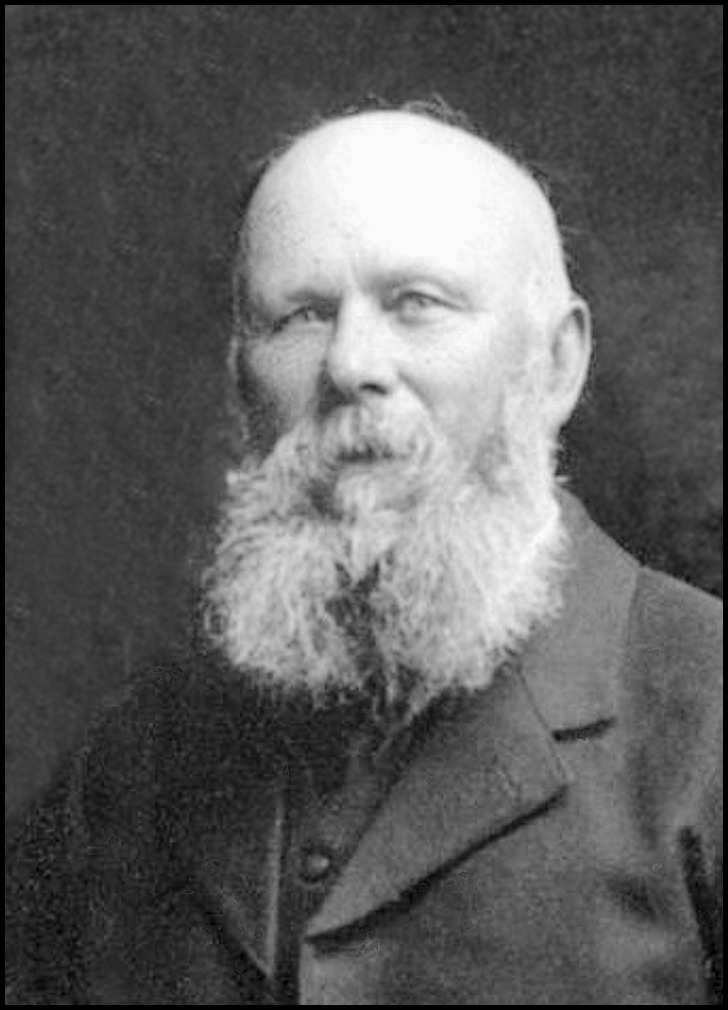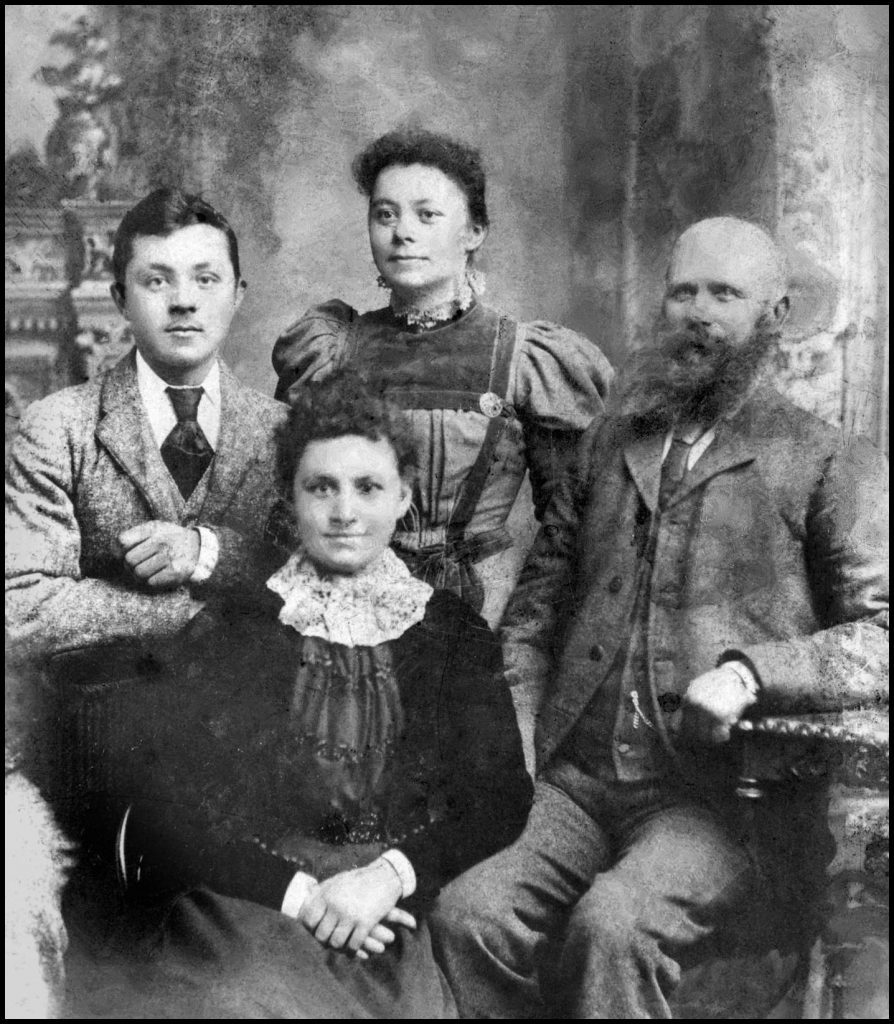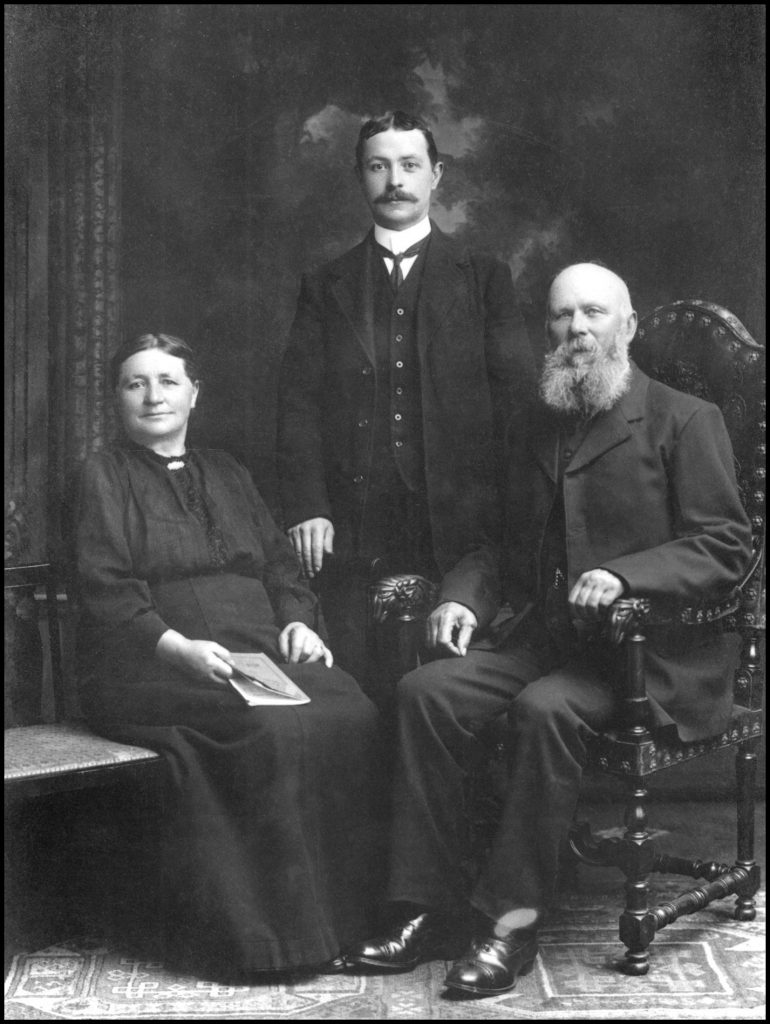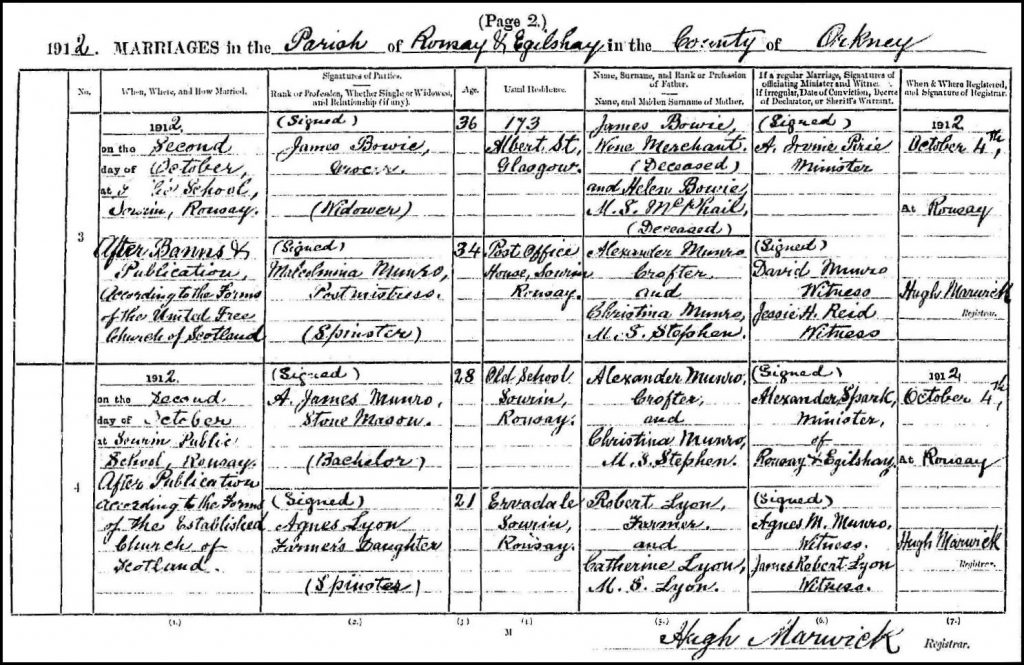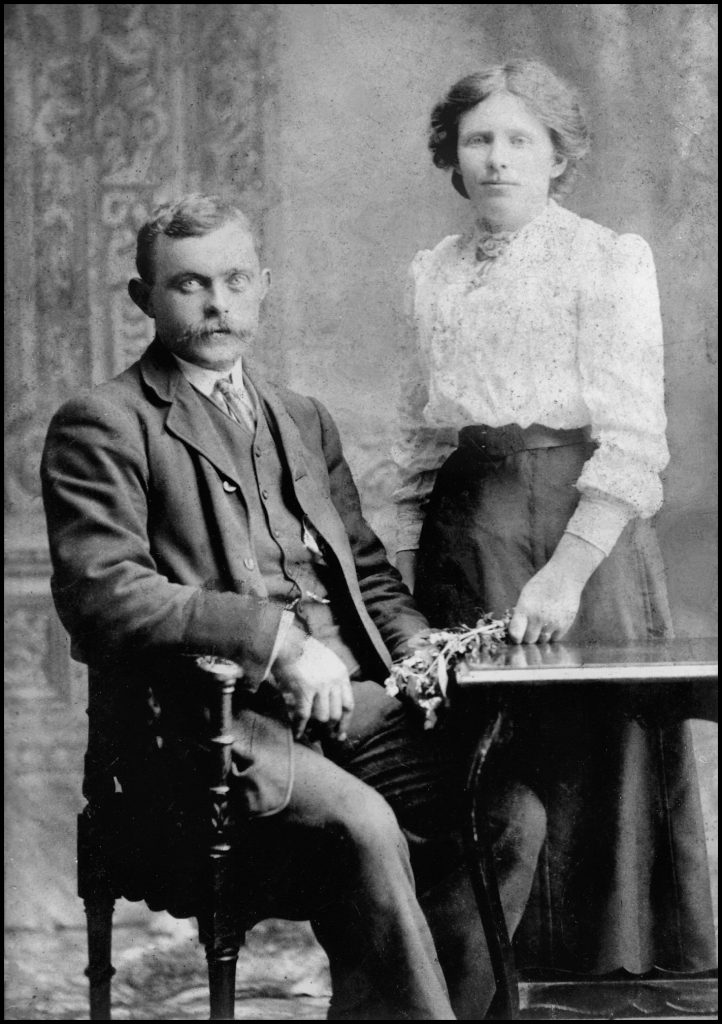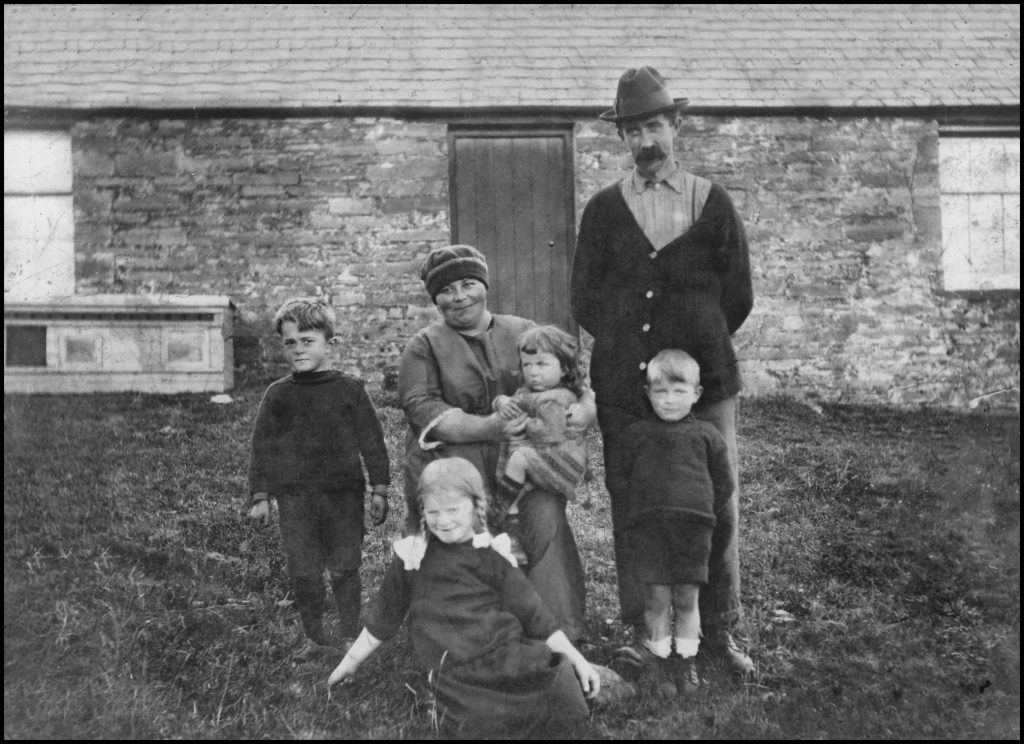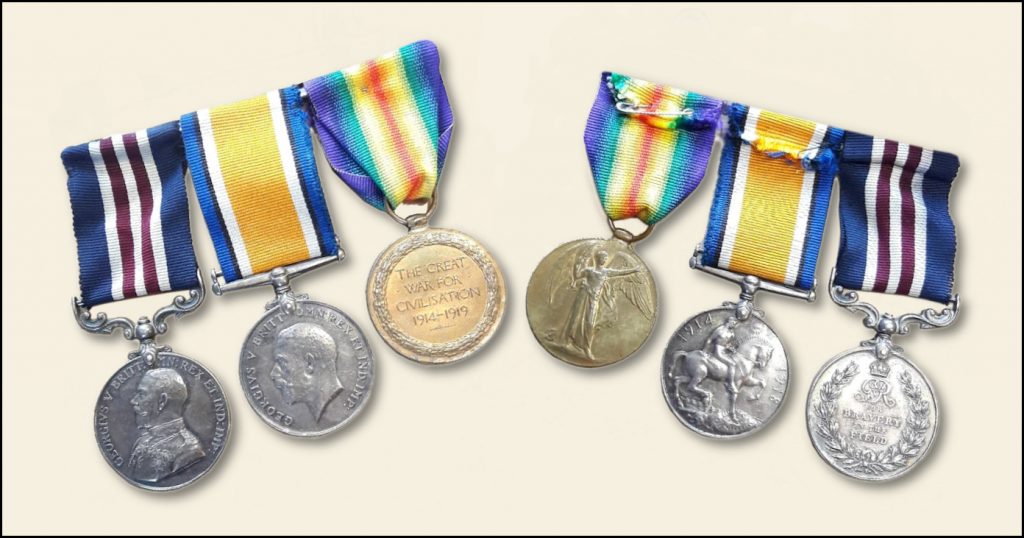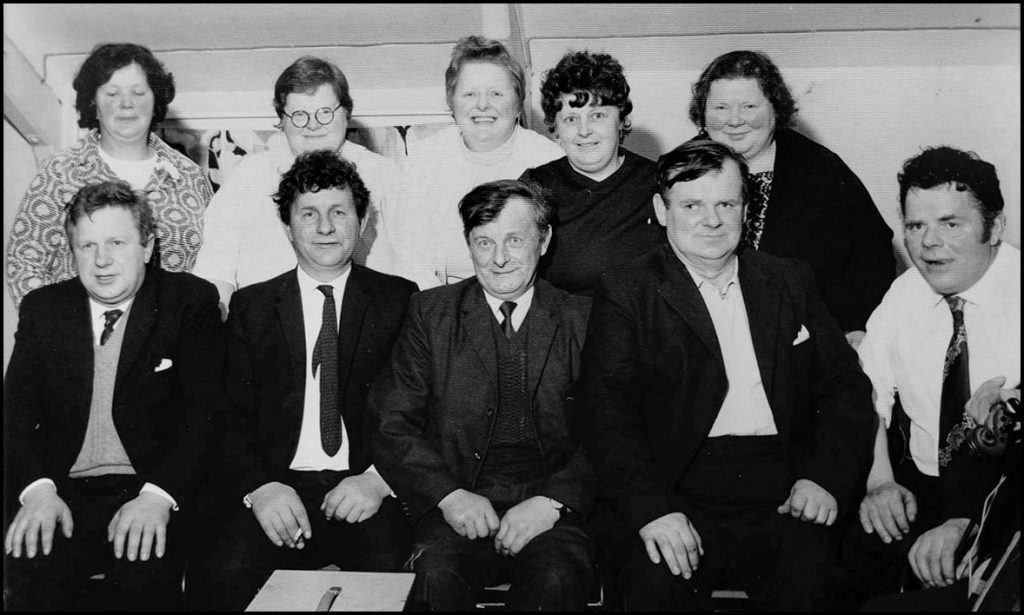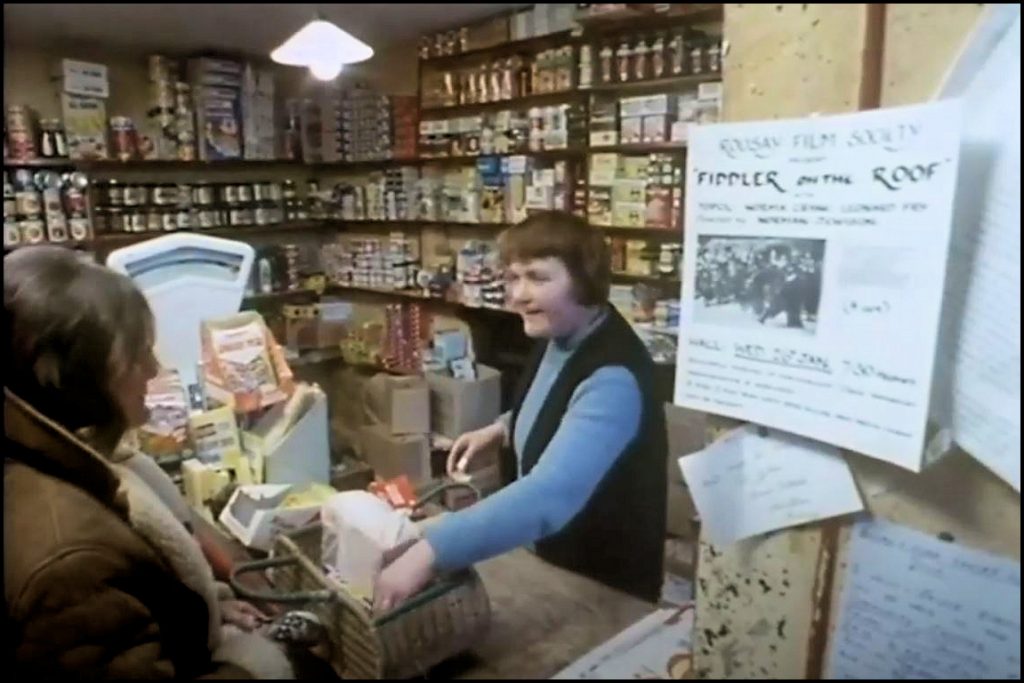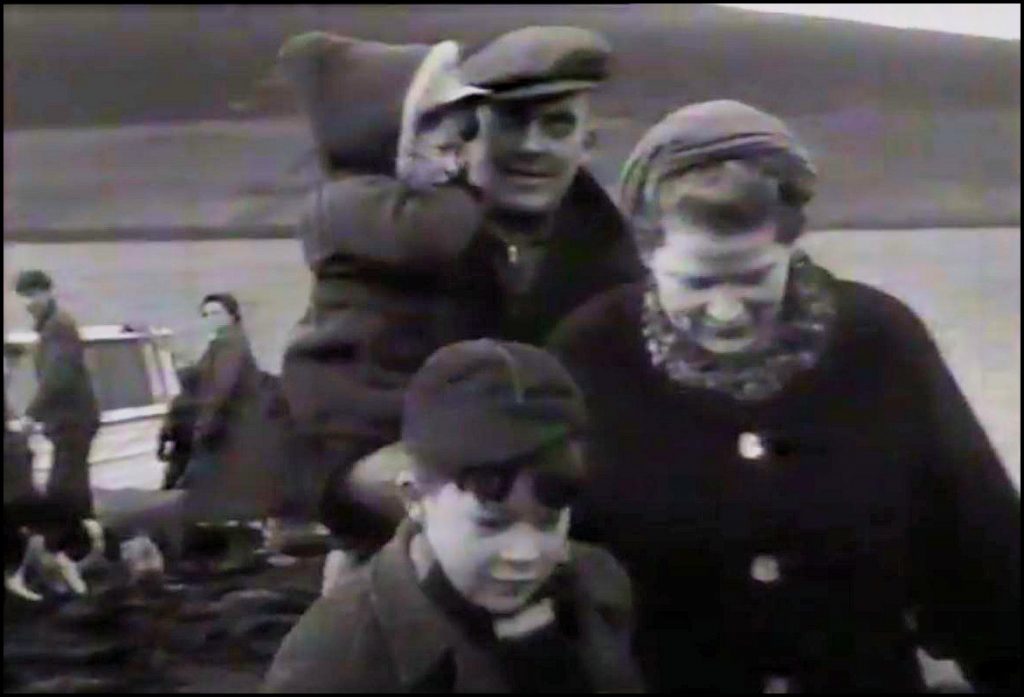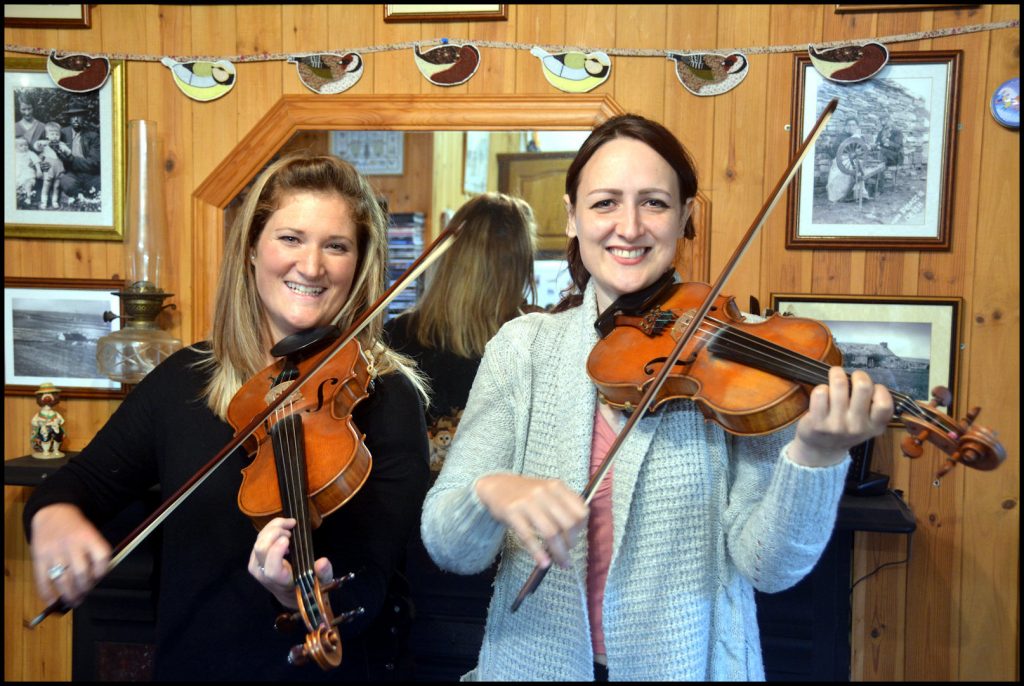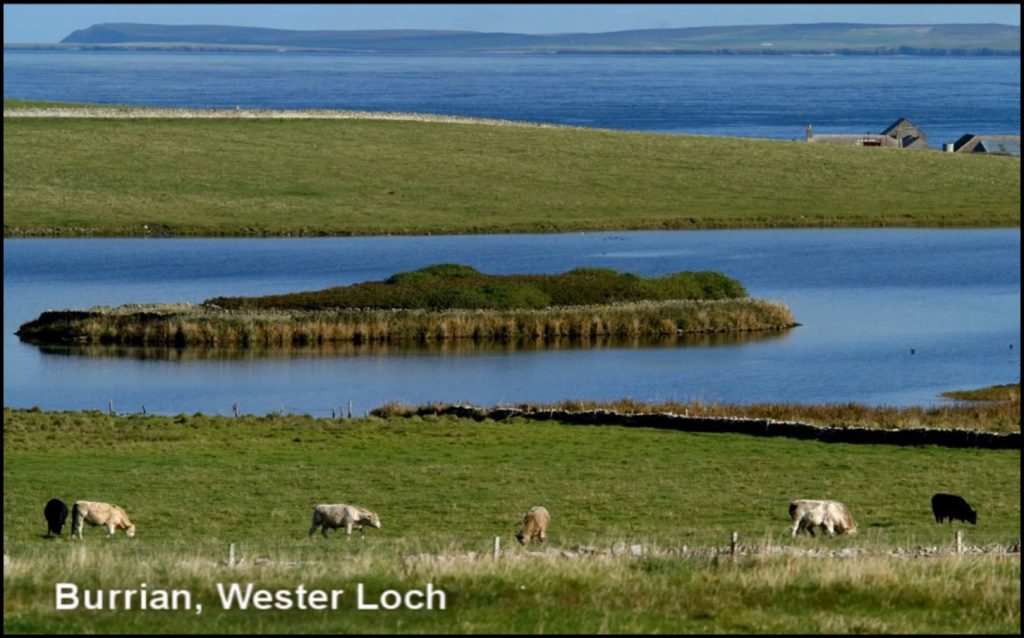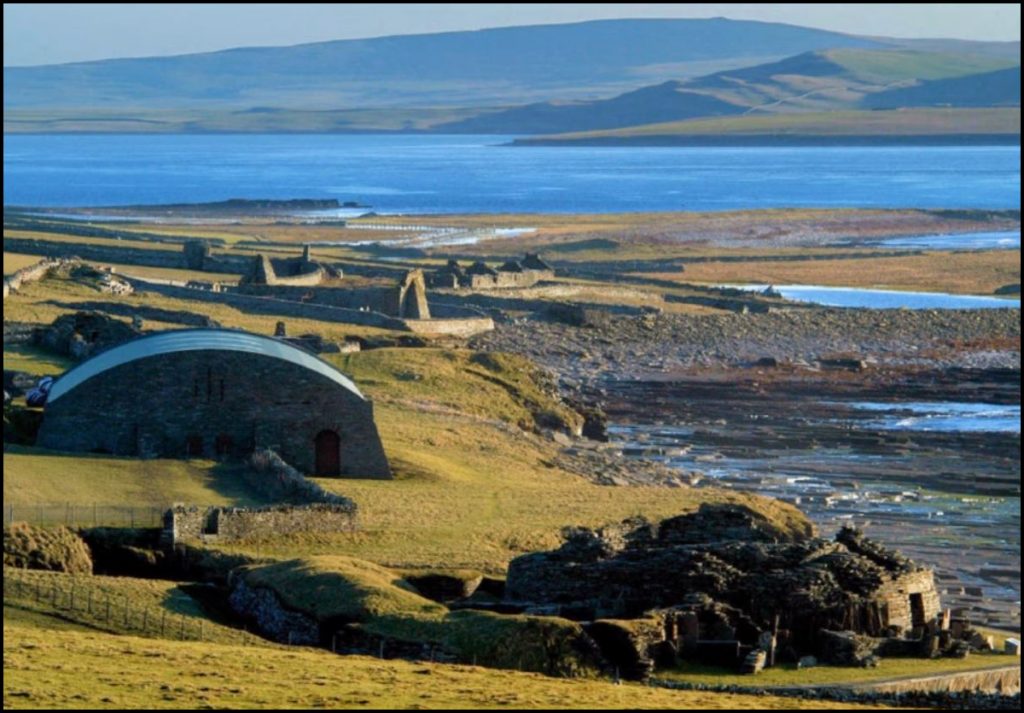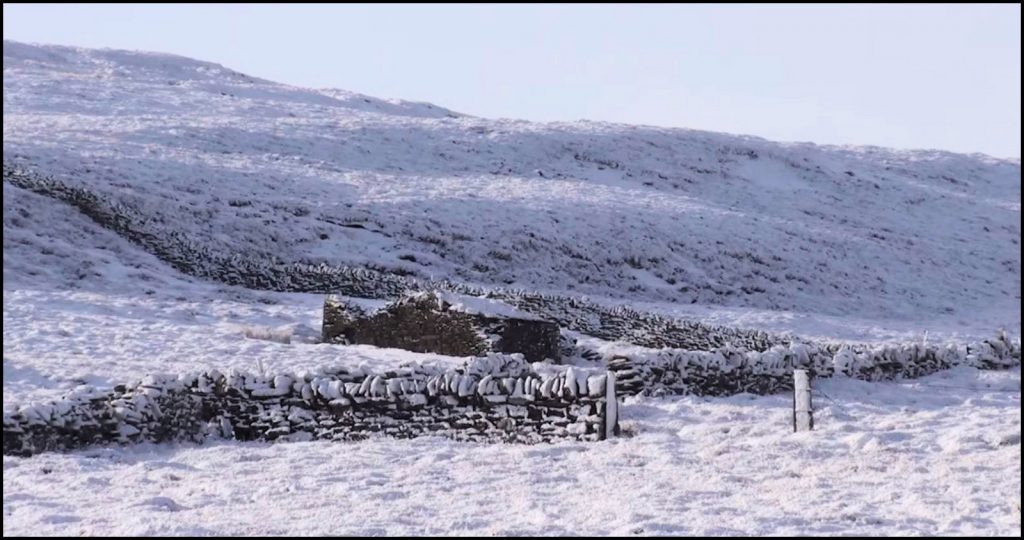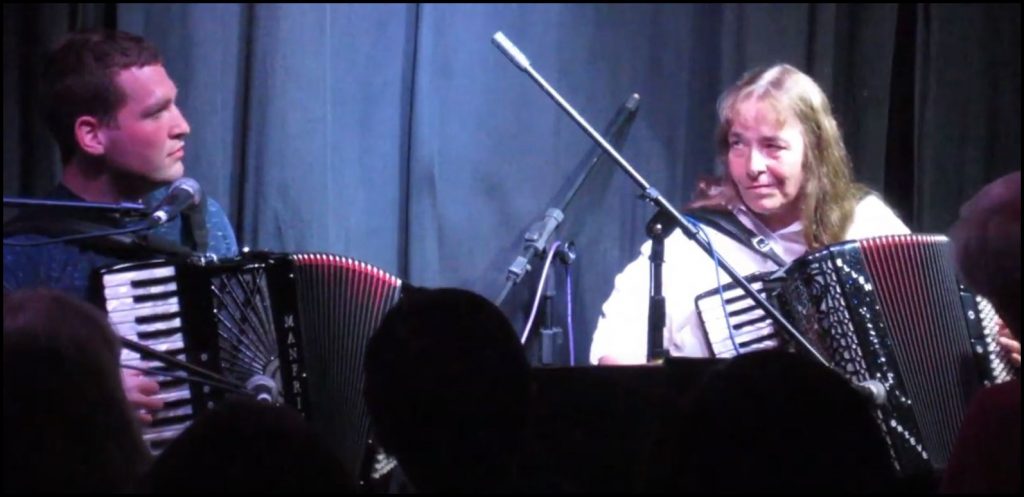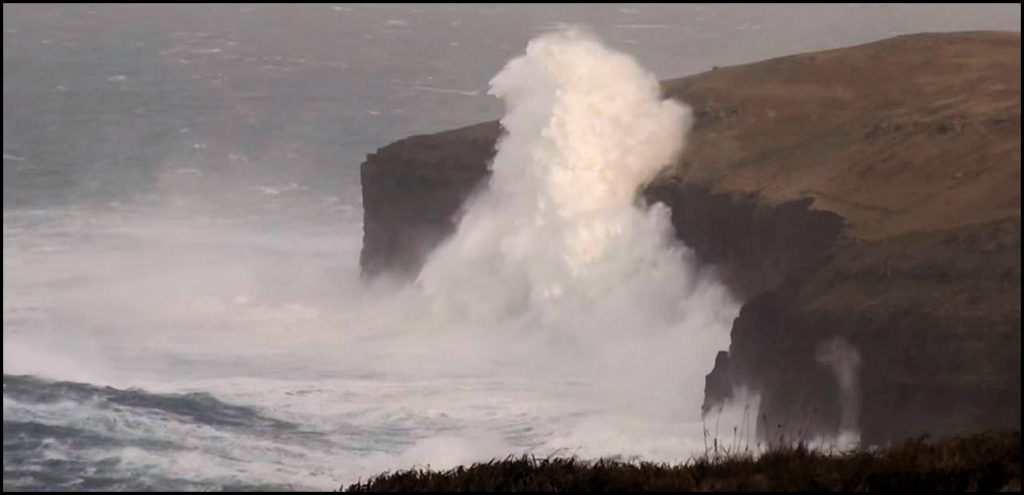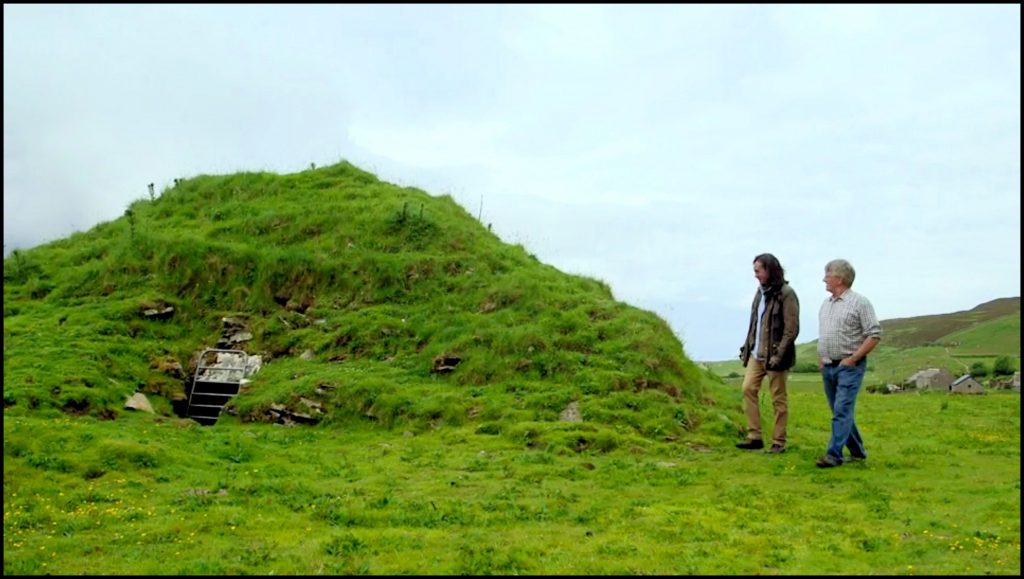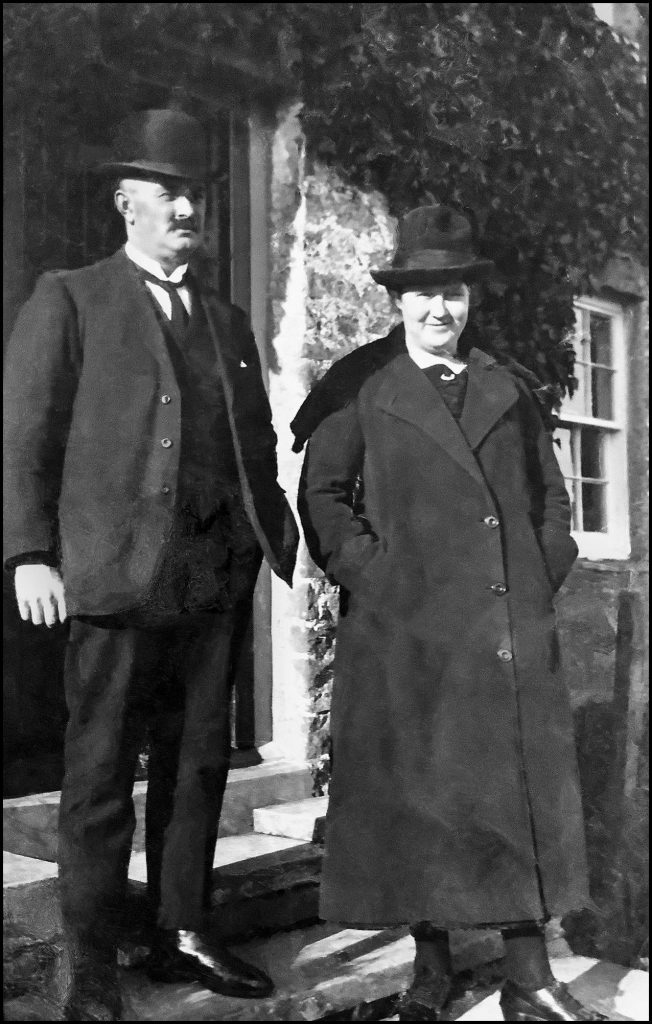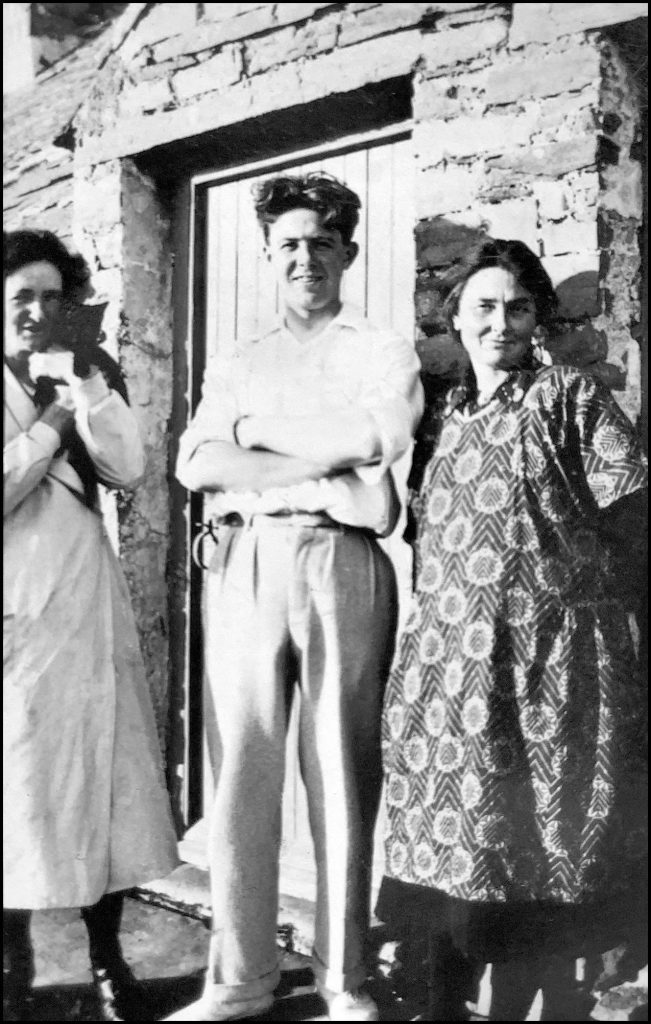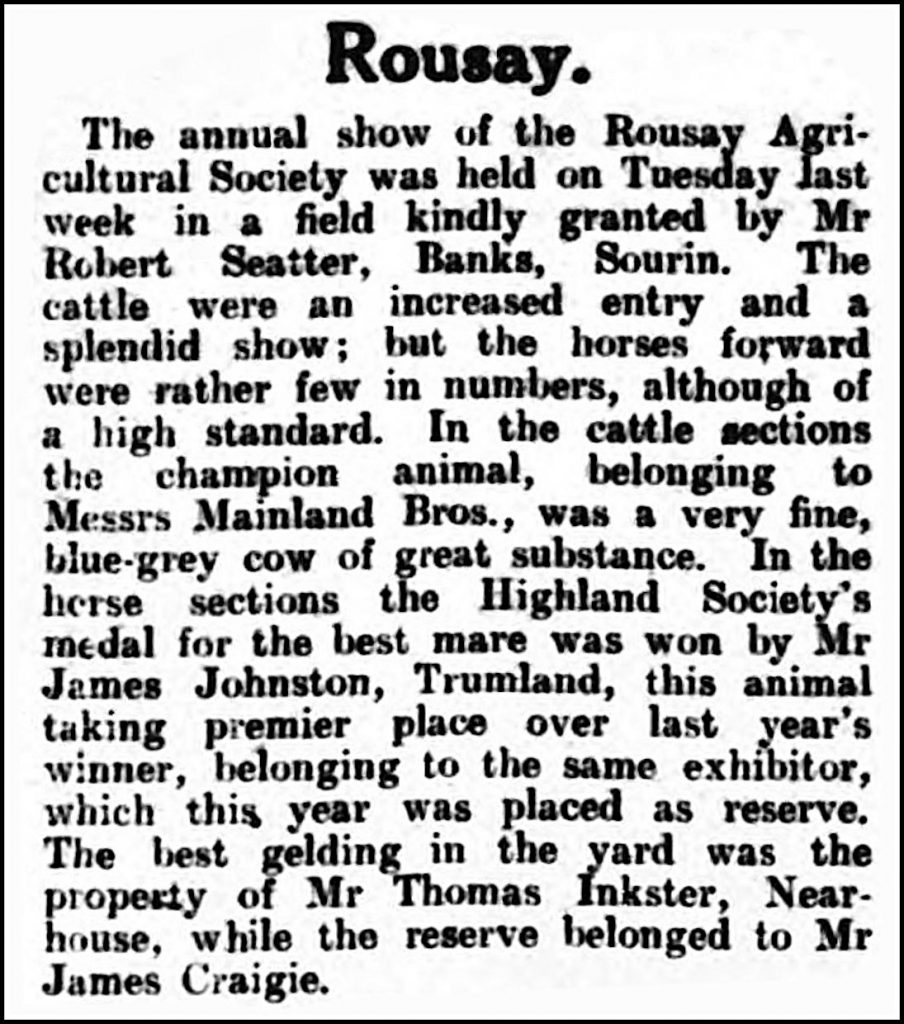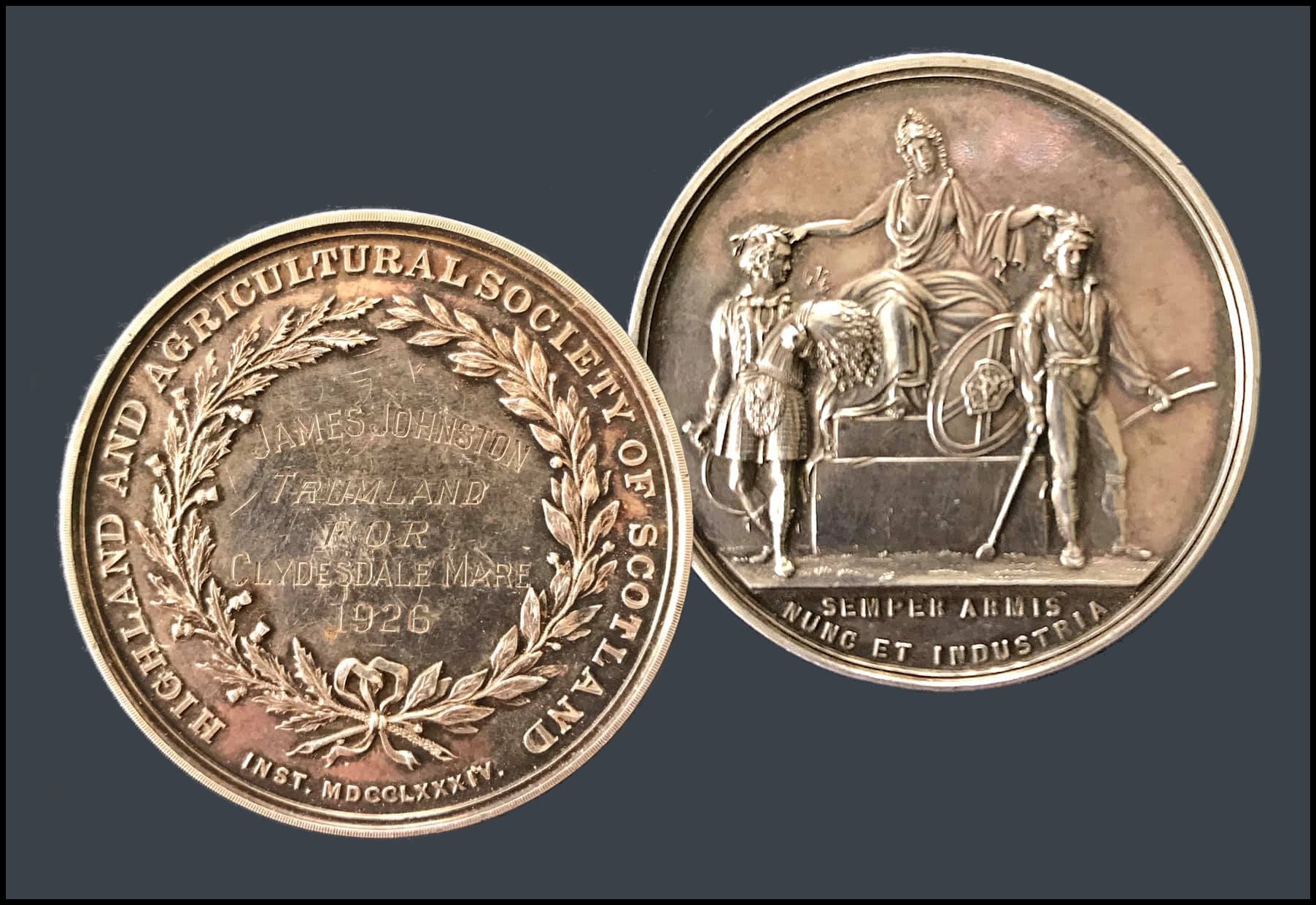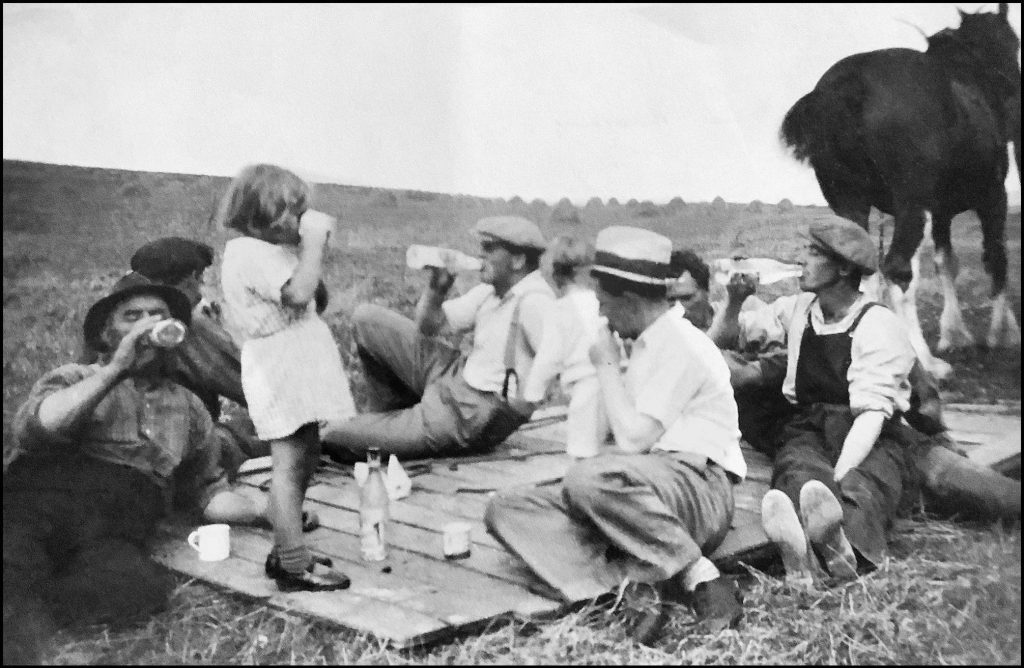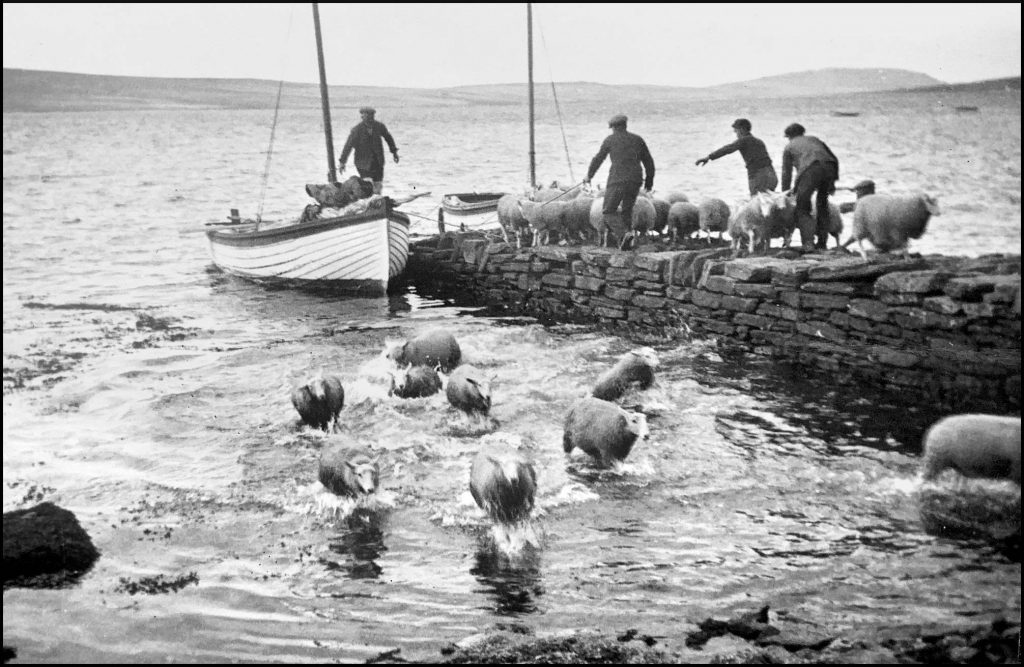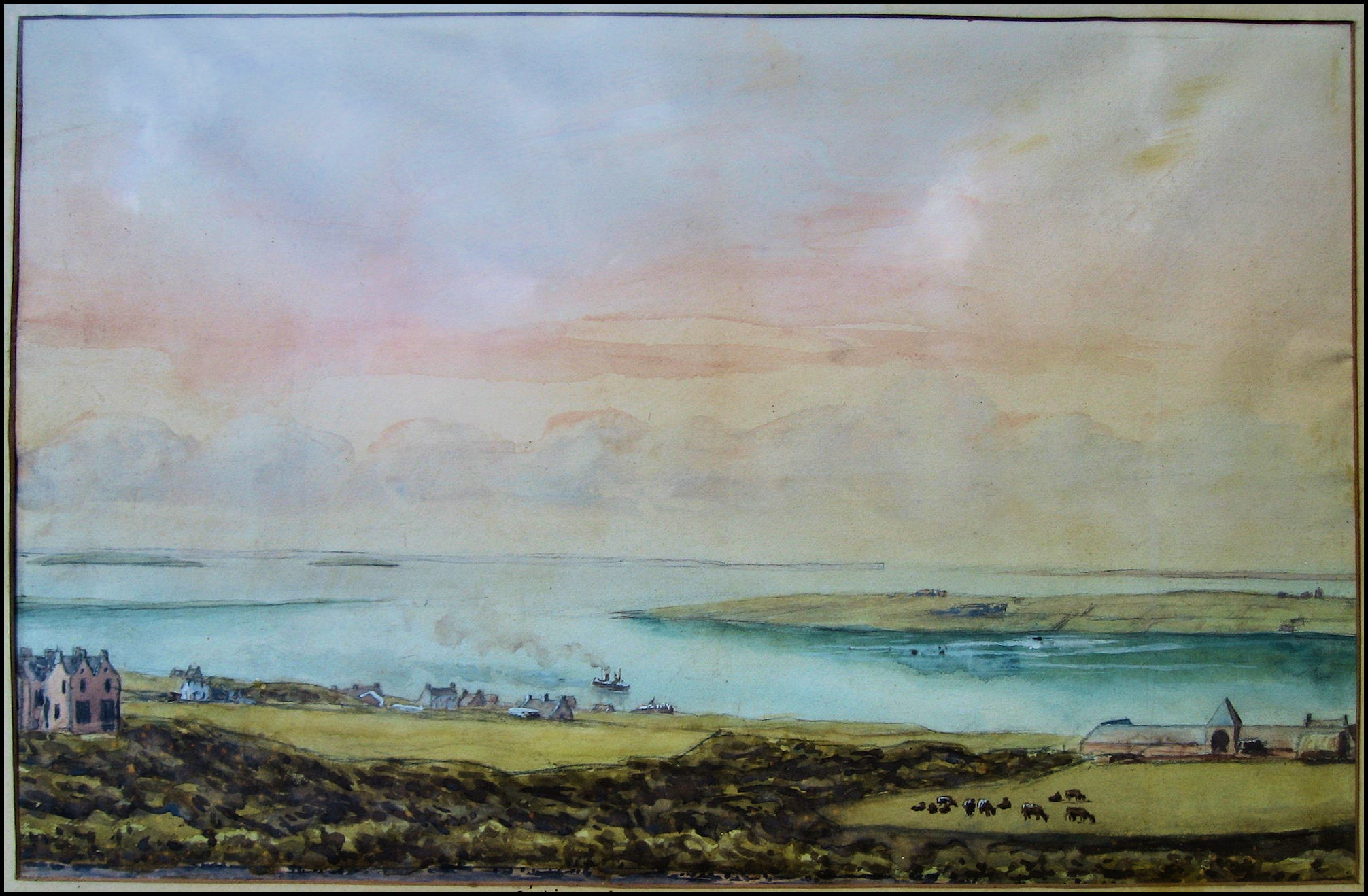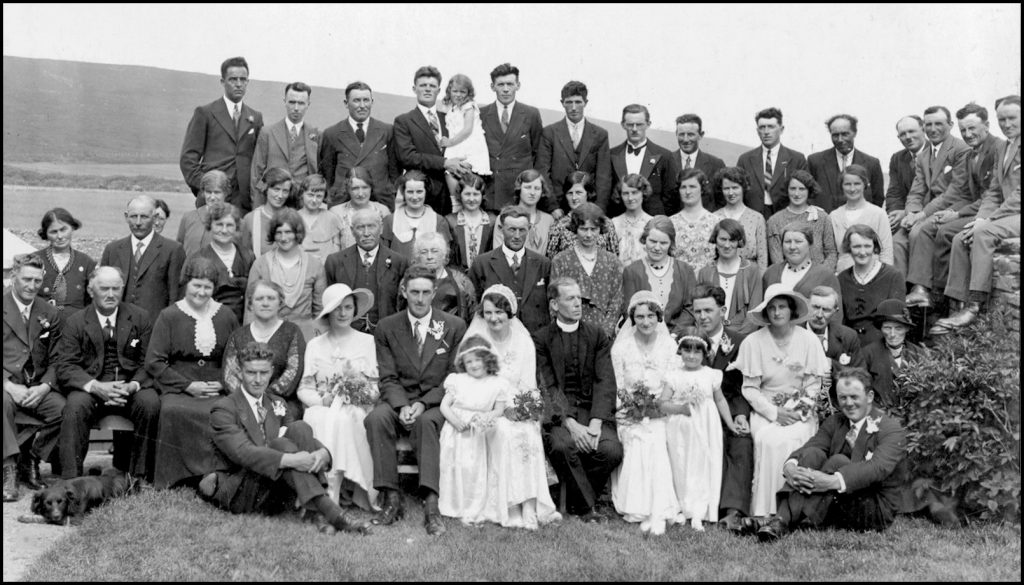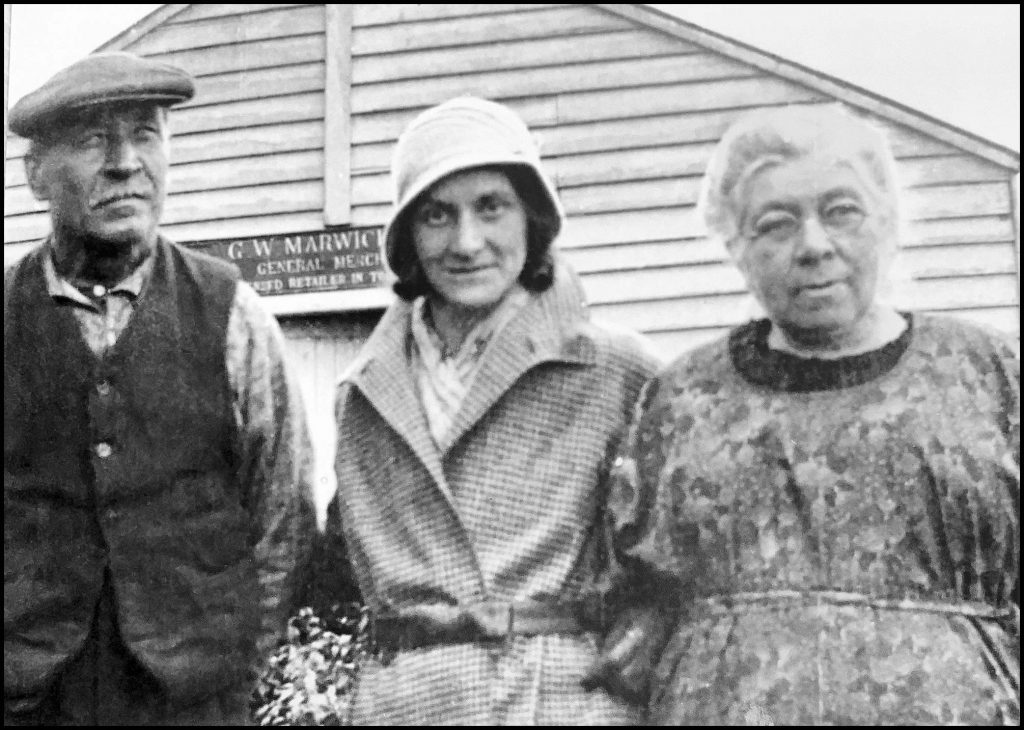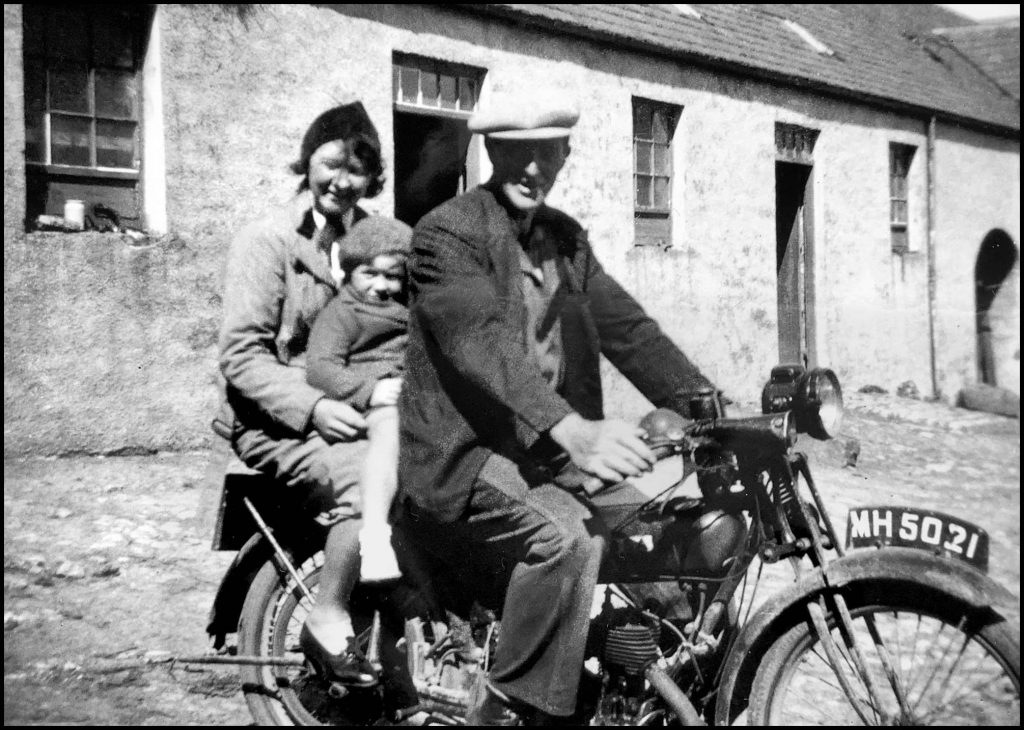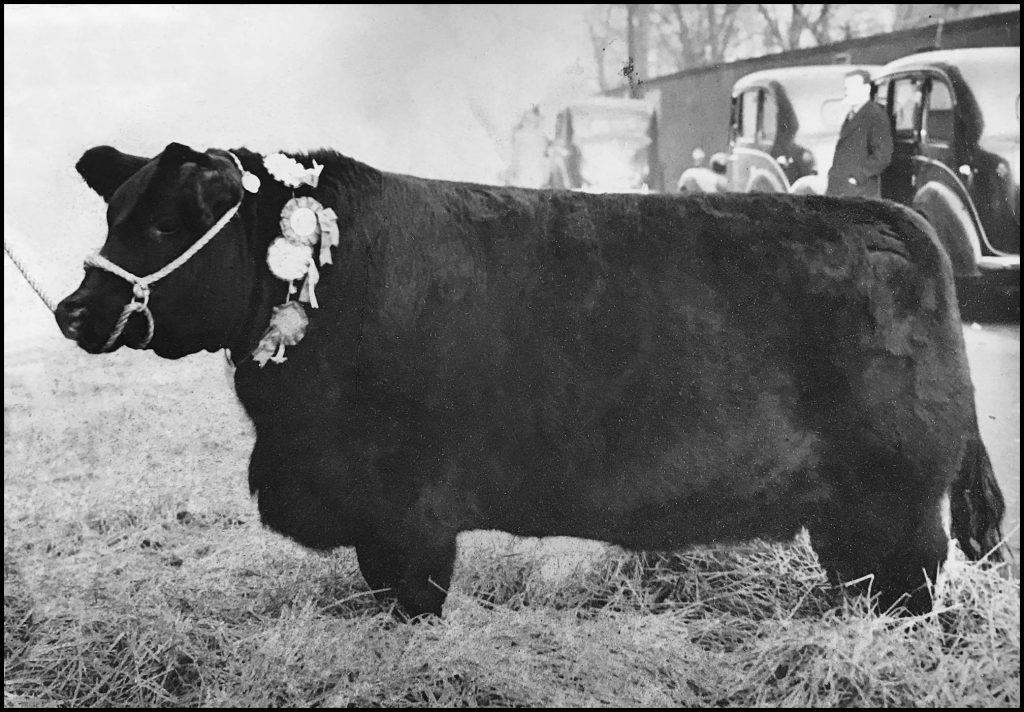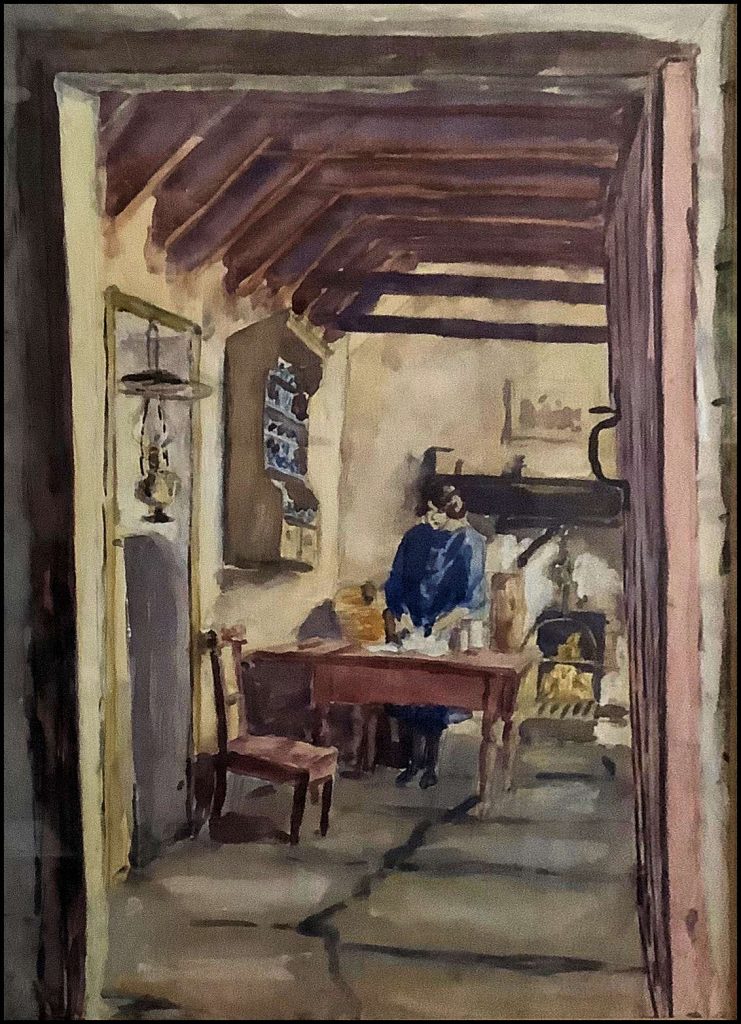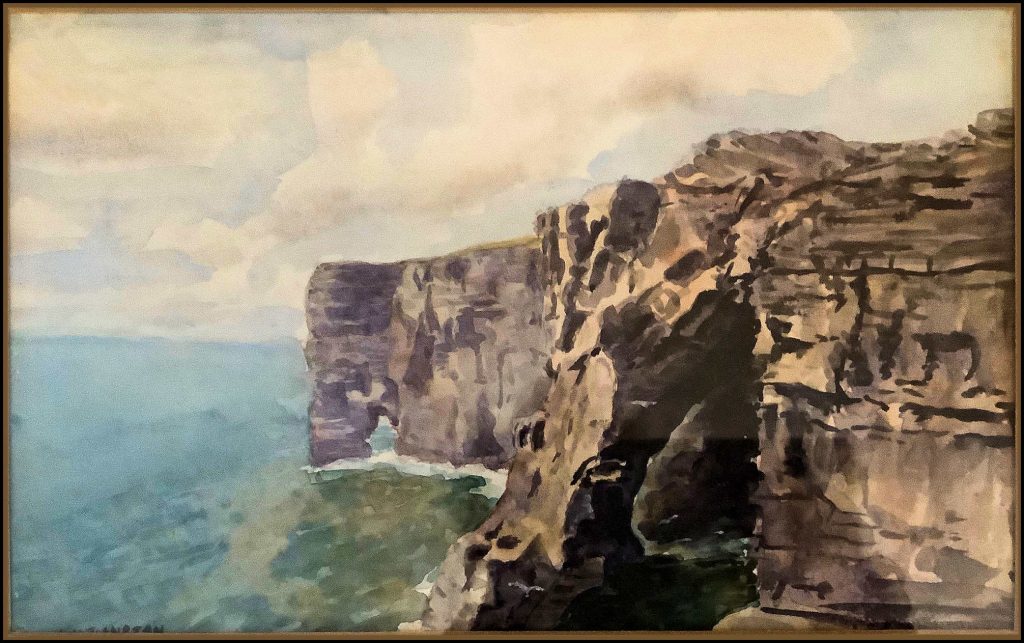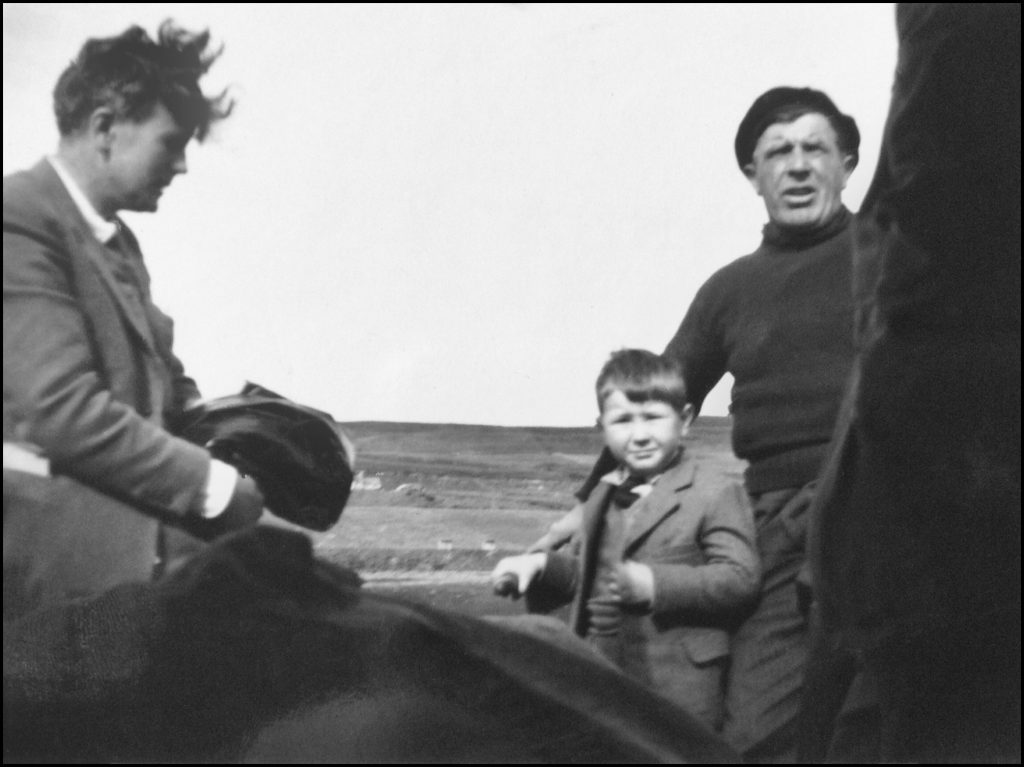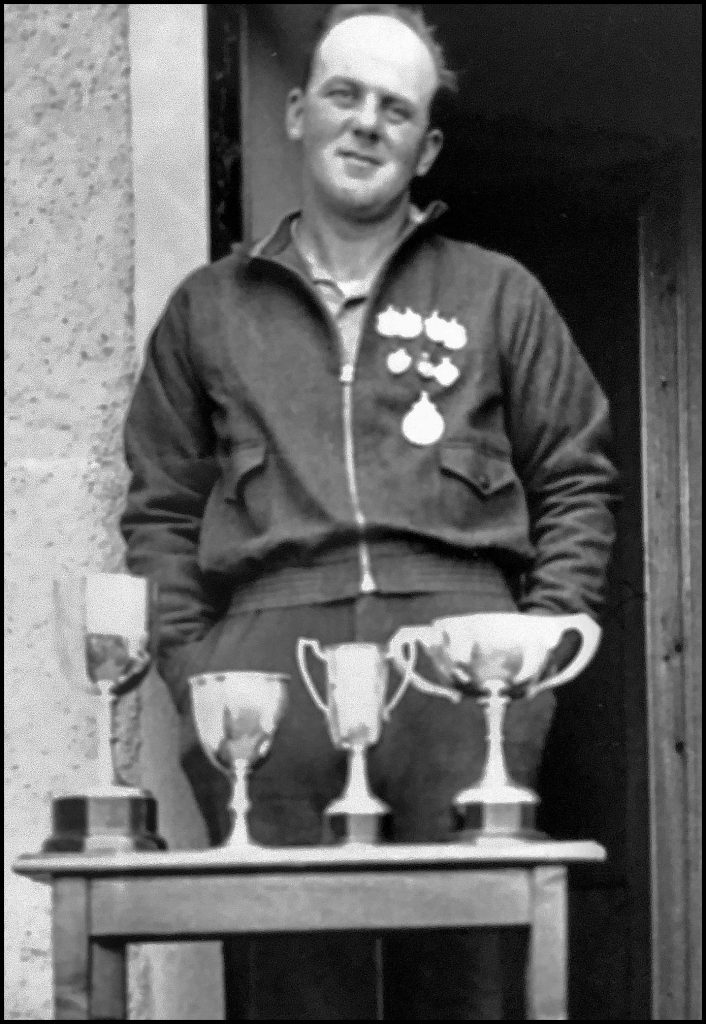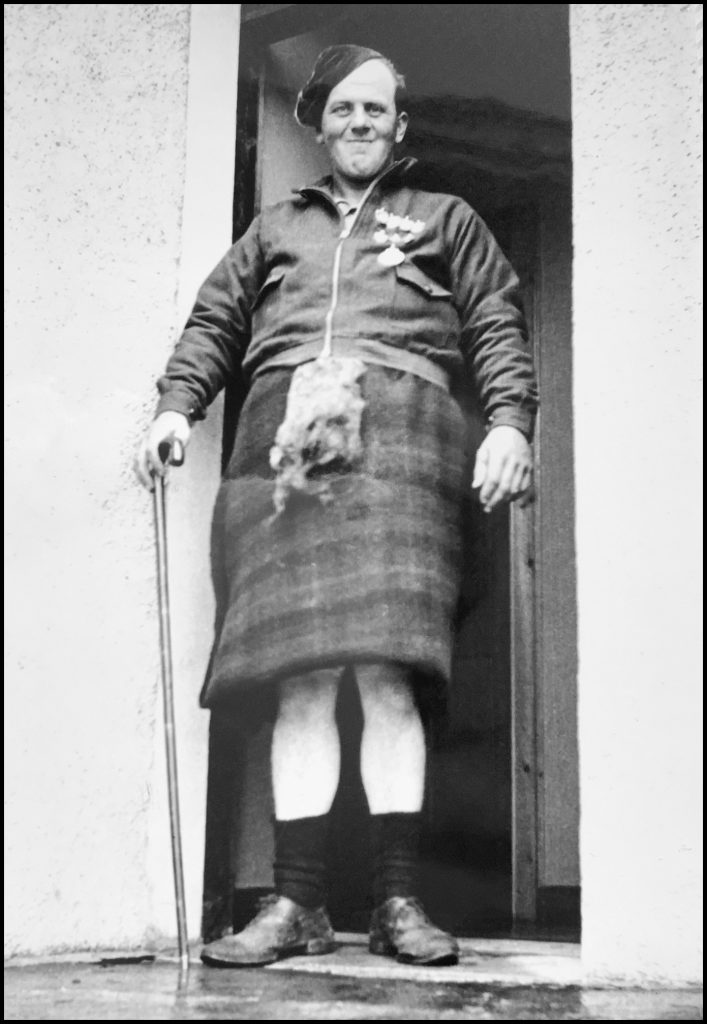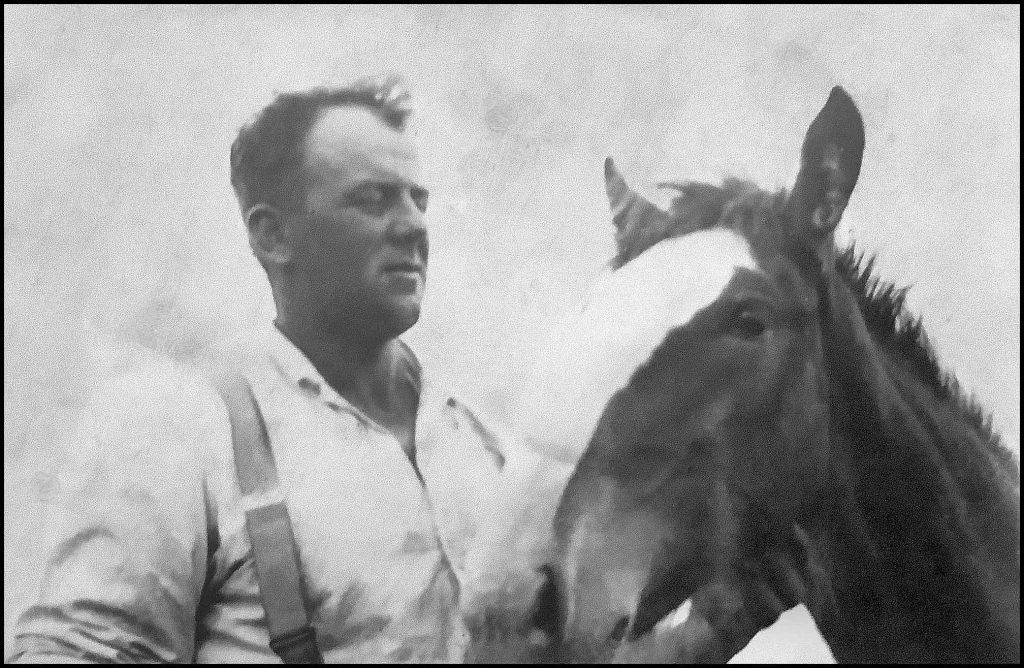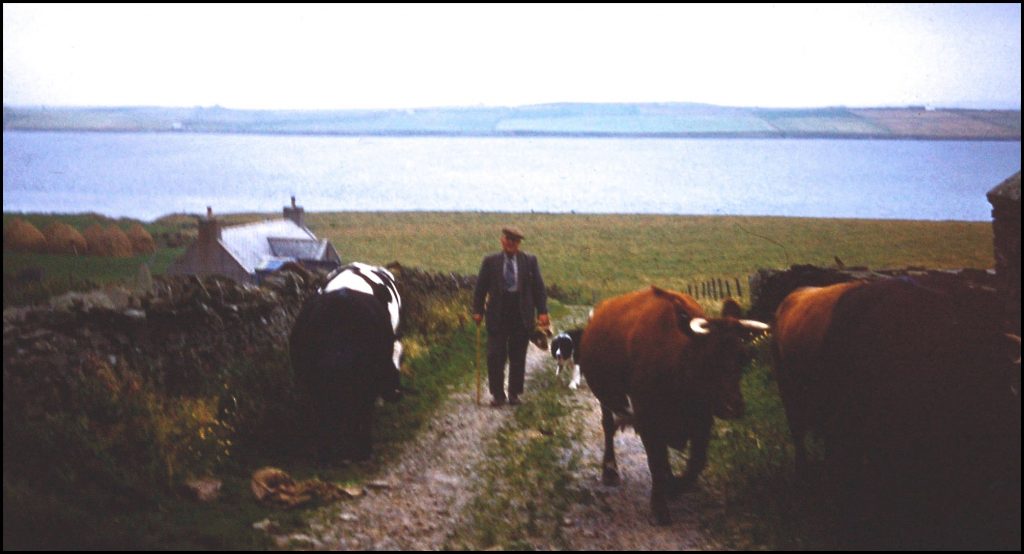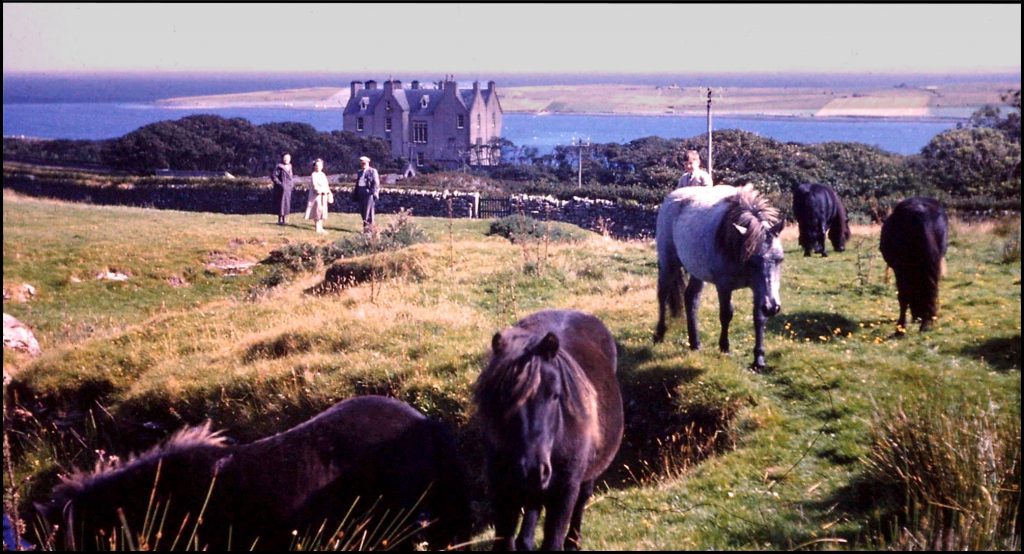This page is devoted to a collection of 29 letters written in the 1860s, 70s and 80s and sent between family in Rousay, Australia and New Zealand. A regular letter writer was Robert Sinclair (1795-1884) of Swandale, Rousay, to his family in Australia, mainly in Melbourne, and New Zealand. Some of the letters contain just family gossip and complaints about old age ailments, but there are also interesting snippets about 19th century life in Rousay and Down Under.
Robert Sinclair’s great-granddaughter Hughna Yorston of Melbourne was eventually in possession of all the surviving letters until her death in 1994. She gave Robert Craigie Marwick a photocopy of the letters in the 1980s for possible use in Rousay Roots, and in turn he eventually passed them on to his nephew John Marwick who took over the running of the Rousay Roots website. The reference numbers mentioned in the transcriptions are the original references which Robert C Marwick allocated to the very first Rousay Roots manuscripts. They were used as IDs and for navigation.
John says – “Transcribing the letters was not an easy task. There were lots of words and symbols I had never seen or heard of and deciphering the spelling was something else. There was also a mixture of proper (or sort of proper) spelling and phonetic spelling in the same breath. I did have a couple of very good transcription helpers – my wife Hilda and our good friend Rhona Mackenzie from Portmahomack, Ross-shire. They are both (ex) schoolteachers, and for some reason or other, teachers have proved to be among the best for this role. The letters contained little in the way of punctuation and no paragraphs, so I took the liberty of adding punctuation and splitting the letters into paragraphs. I imagine that writing paper would have been expensive and paragraphs a luxury even if they had been considered.”

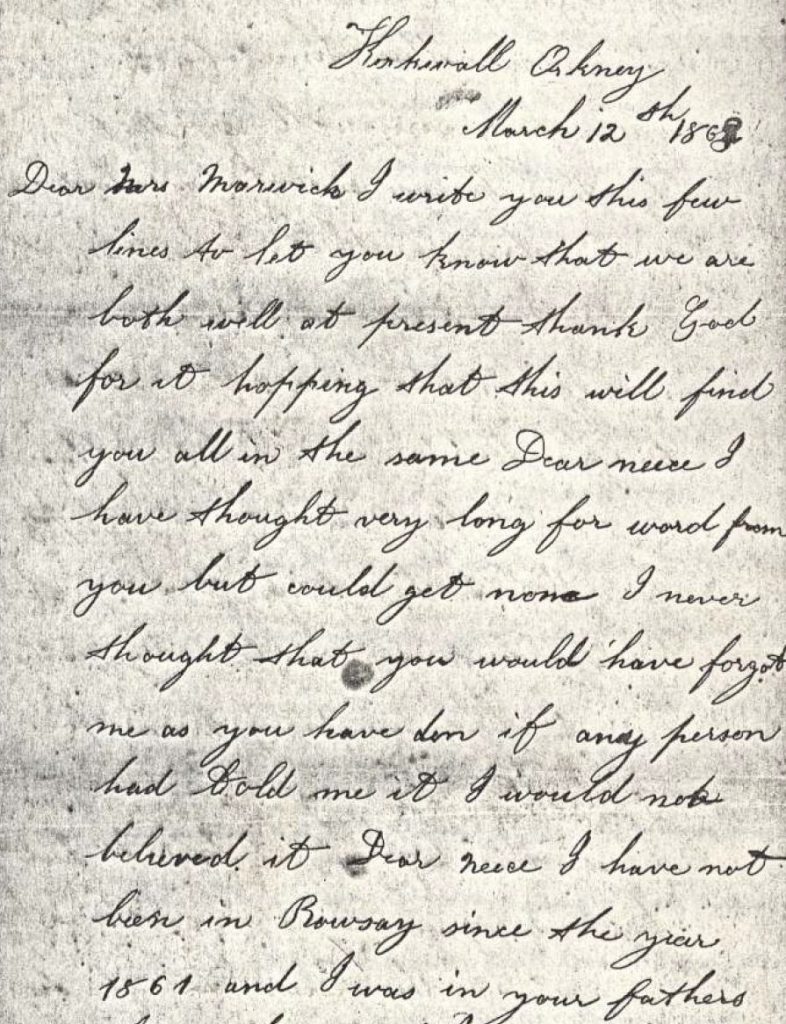
Letter from Margaret Mowat in Kirkwall, Orkney to her niece Margaret Sinclair (A622) in Australia, wife of Hugh Marwick (A19)
Kirkwall, Orkney
March 12th 1863
Dear Mrs Marwick.
I write you this few lines to let you know we are both well at present, thank God for it. Hoping that this will find you all in the same.
Dear niece, I have thought very long for word from you but could get none. I never thought that you would have forgot me as you have done. If any person had told me it, I would not believed it.
Dear niece, I have not been in Rousay since the year 1861 and I was in your father’s house there and I got my tea in it, and they was all well and in good spirits and is yet as far as I hear.
I have been sending off eggs to Edinburgh for my occupation this time back and was coming well on, but my Agent is broken and I have lost every penny that I had in the world, and worst of all has found myself in debt and before this happened Jemima was in a place. She was baby’s maid but I took her home thinking that I could keep her respectably with me to be a company to me, for I thought very long myself. But when this happened I had to put her out again. She is now the only servant in the house and she has very little work and a good Master and Mistress. It makes me glad when she is well off, but still I feel very lonely to be in the house myself.
Dear niece, I am very sorry to ask you a favour, but I would be very glad if you would send me a little money to help me on a little if it was ever so little. I am very sorry to trouble you but it is necessity that is making me do it.
We are living in the door below where we was when you went away. Jane Mowat is a servant to the Sheriff. She is baby’s maid and Lady has 5 children. Sister Betty has no a baby yet. Brother Thomas is very feeble. He is never been stout since his son David was lost. John and his wife is been very unwell this winter but they are better now.
Jemima sends her kind love to you all and kisses out of number to her little cousins. Please write me as soon as you get this and let me know if any person is written anything against me that is hindered you to write me.
I will write no more at present till I see if you get this or not. All at present but remains your affectionate aunt till death.
Margaret Mowat
Wellington Street
Kirkwall
To: Mrs Hugh Marwick
Esay Street
Collingwood
Melbourne
Australia
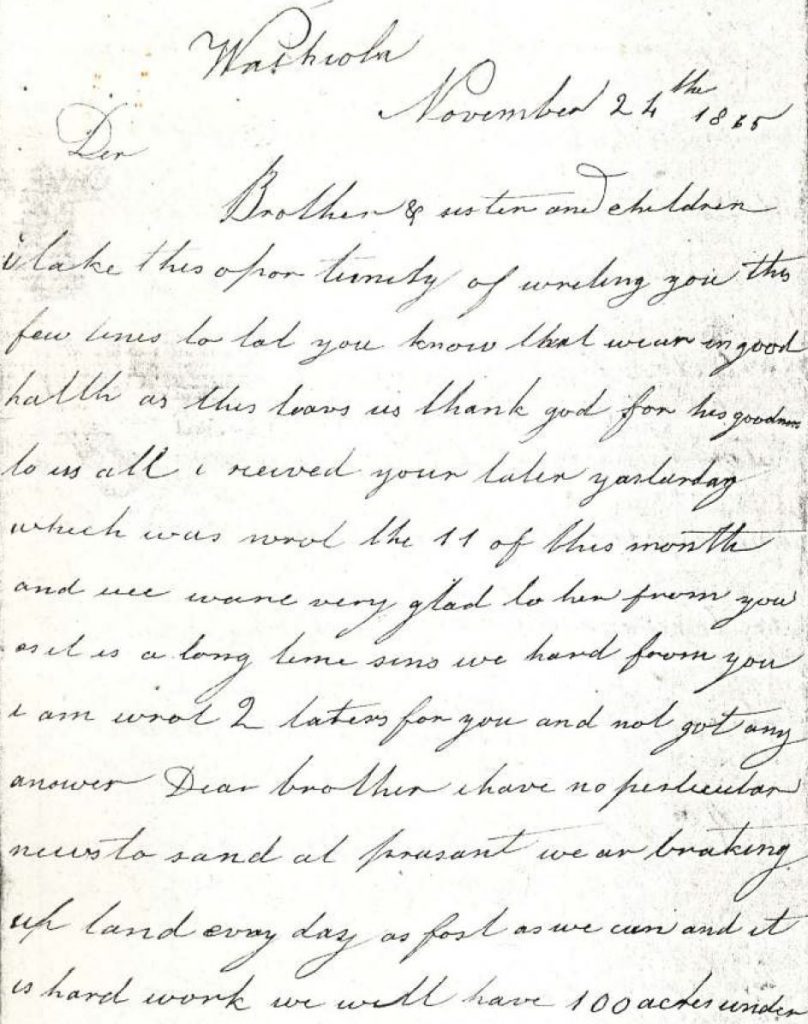
Letter from Hugh Yorston in New Zealand to his Brother in Law, Hugh Marwick (A19) in Australia, suggesting that the Marwicks should return to NZ.
Waibola, November 24th 1865
Dear Brother and Sister and Children.
I take the opportunity of writing you this few lines to let you know that we are in good health as this leaves us, thank God for his goodness to us all.
I received your letter yesterday which was wrote the 11 of this month and we were very glad to hear from you as it is a long time since we heard from you. I am wrote 2 letters for you and not got any answer.
Dear brother, I have no particular news to send at present. We are breaking up land every day as fast as we can and it is hard work. We will have 100 acres under crop next year. I bought a mare about 2 months ago which cost £60 and now we have as good a team of horses as you will see anywhere.
Dear brother, I think you would do better to come over here to us. The house is standing as you left it. Isaac is stopping at the Sessions (?) as yet. Thomas is left there about a week ago for the sheep shearing and your father is in good health as you left him.
Ann is left here, she is in Tokomairiro, a servant to the banker. William Gibson is stopping with Sinclair Harrold. He is been with him 3 months. Hugh Marwick is still on Stewart Island. There is no much fear of him going home, he has nothing to go home with.
Your brother in law is in the Molonux as yet. We get letters from him regular. We got a letter from Peter Reid last week. He is at the west coast. He says he is going to make his pile in the summer.
Dear brother, I am to inform you about the cattle. There is no disease reached us as yet and we are not thinking long for it.
Mr Mollison and Mr Charend is taken a run far south and they wanted me to go in with them, but I would not join them. They have 12,000 acres and they are bought a good many cattle from Craigie 45, and from Sinclair 18 or 20. Our run here is getting very bad, it is over stocked.
Dear brother, the times is not so bad in New Zealand as you think. We will very soon have a railway from Dunedin to the Cluthe ferry.
The provision is been very cheap this year …I am sold oats for 2s 6d and eggs for 1s the dozen. But it is all taken a start. The oats is selling now at 5s 9d and everything is rising fast.
Dear Brother, when you write, let us know about all our Rousay folk and especially about Mistress Robert Gibson, widow and children
No more at present, but remains your brother and sister Betsy.
Hugh Yorston
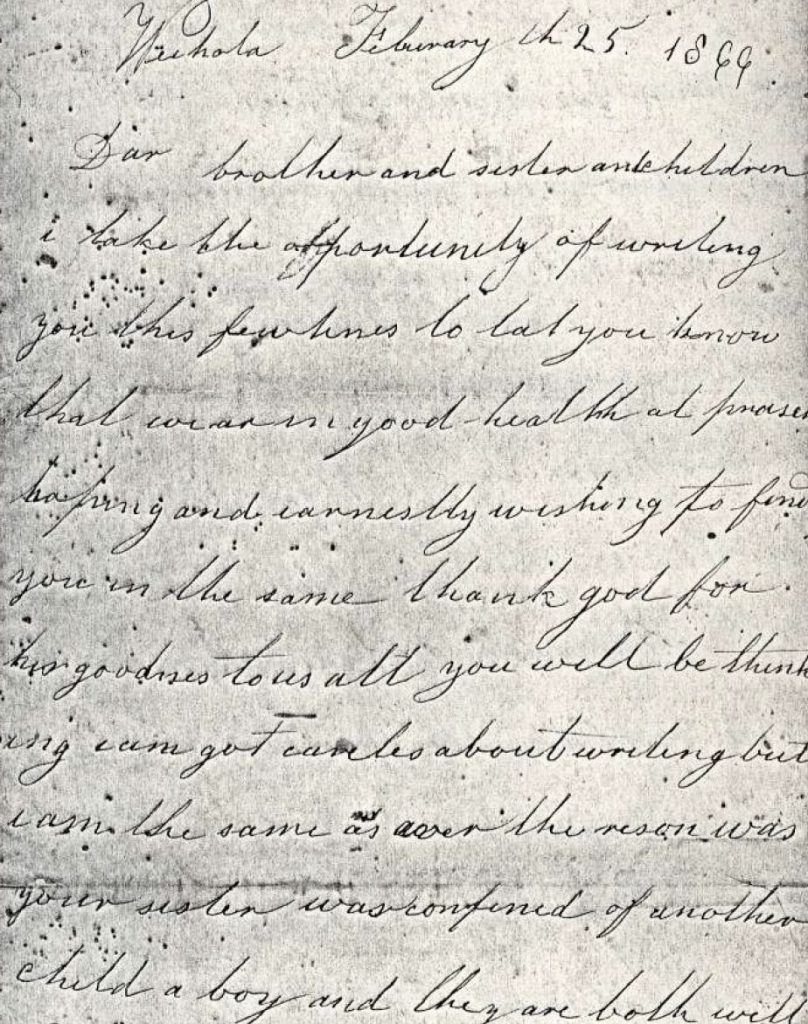
Letter from Elizabeth Marwick (A20) and her husband Hugh Yorston in New Zealand to her brother Hugh Marwick (A19) in Australia.
Waibola
February 25th 1866
Dear Brother and Sister and Children.
I take the opportunity of writing you this few lines to let you know that we are in good health at present, hoping and earnestly wishing to find you in the same, thank God for his goodness to us all.
You will be thinking I am got careless about writing, but I am the same as ever. The reason was your sister was confined of another child, a boy, and are both well.
I have no particular news to send. We have a very busy time here now cutting our crops. We have a fine crop this year. We have had plenty of rain this summer which is made plenty of everything to grow. It is not been the case with you. Dear Hugh I was expecting you over here before this. You know very well you can do better here than in Victoria. I had a conversation with Isaac and Thomas about the house and they are quite agreeable to you having it. It is standing as you left it and they are stopping with Richard, and Ann is with the banker in Tokomairiro.
Your father is well as usual. William Gibson is stopping with Sinclair Harrold. I saw him the day at the church today and he is in good health.
Dear brother, you need not be afraid to come over here for want of work, plenty of work here now. I am put up a new barn and I kept it back a month expecting you owr, and then I gave the job to Bill. It is 40 x 15 and we are got some of our stuff in it as I could wait no longer after you.
Robert Sinclair was here with us over the Christmas week and he is still at the same place. He thinks you should come over here. You stopped too long where you are dear brother.
I got a lot of letters from home last night and all our friends is well. My sister is been over at Egilsay and two nights in Kirbist. Margaret and family is well.
You wanted to know about the cattle disease. We are not seen any of that trouble here as yet. The cattle is cheapest nor I ever saw them. I bought a cow and calf for £6, butter is 1s 6d per lb, beef 6d per lb, eggs 6s 9d the dozen, flour at £42 a ton or £2 8s the bag.
Dear brother, when you get this you will give me an answer as soon as possible whither you intend to come over here or not, and if you do come I will send my horse and cart to take you out here from Dunedin.
No more at present but remains your affectionate brother and sister.
Betsy & Hugh Yorston
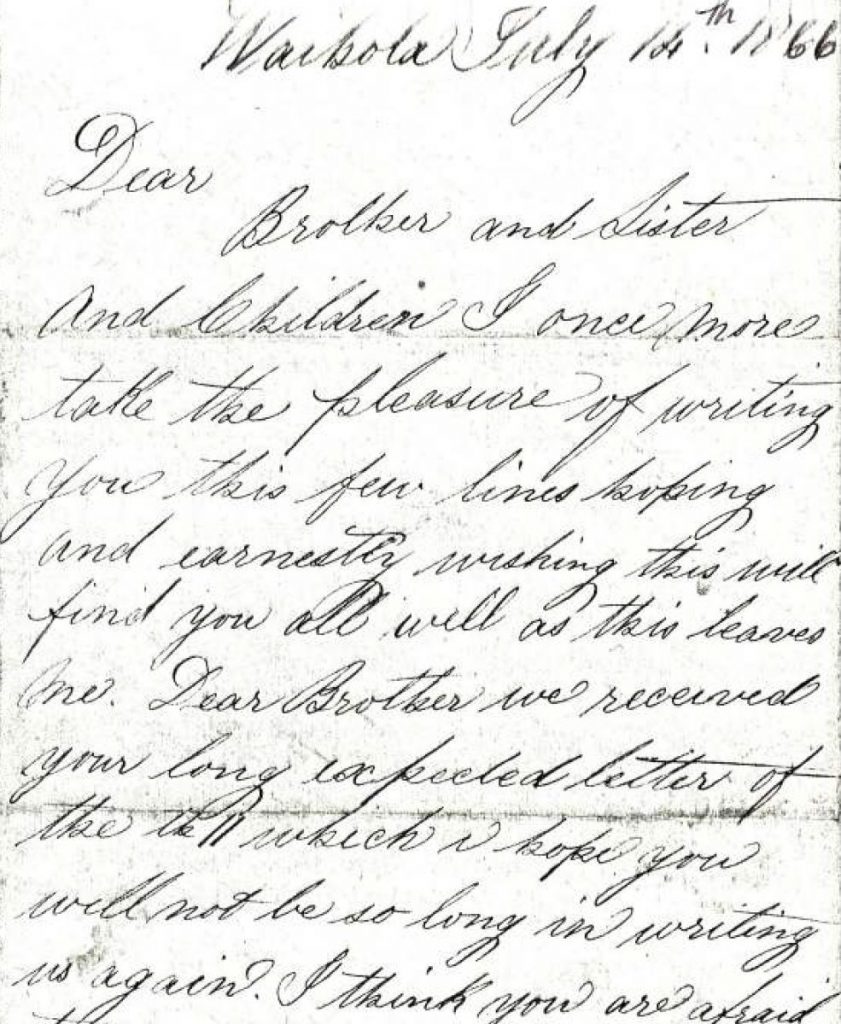
Letter from Elizabeth Marwick (A20) and her husband Hugh Yorston in New Zealand to her brother Hugh Marwick (A19) in Australia.
Waibola
July 14th 1866
Dear Brother and Sister and Children.
I once more take the pleasure of writing you this few lines hoping and earnestly wishing this will find you all well as this leaves me.
Dear Brother we received your long expected letter of the 11th which I hope you will not be so long in writing us again. I think you are afraid to come to New Zealand but I think you need not for you would get plenty of work here now. And I spoke to Thomas and Isaac about the house and they are quite agreeable for you to have it and there is no more signs of them to go to it than before. So if you now intend coming over here I think the sooner the better for they may soon change their mind.
James Harrold is been here for about two months and he is building a fine new craft and Richard is going up with him to do the iron work of her, and they are to sail tomorrow. She is 70 ft of keel and 21 ft wide and Hugh Marwick (A53) is still working at her in Stewart Island.
You were wanting to know the price of cattle. Good milk cows from 7 to 12 pound and fat bullocks from 10 to 12 pound, and flour 16 shillings per ton and potatoes from £3 to £5. Oats is taken a rise 4s 9d per bushel, butter 2s 6d, eggs 2s.
Your father is in good health. Ann is in Tokomairiro, a servant and in good health. William Gibson is stopping with Sinclair Harrold and in good health. Your Brother John is bought Finchey (?) with Uncle of Broland and John of Knarston.
We have had a very fine Harvest and likewise a fine Winter so far, yet we have had scarce any rain as yet, but there is plenty of water here all seasons. The cattle disease is not visited as yet and we are not thinking long for it. We are expecting the railroad to commence here soon and it will make a stir amongst us again.
Walter and Julia and family is in good health and got another son little Richard, and Thomas never forgets you. They are going to school every day and reading in the 4 book.
No more at present but remains your dear brother and sister.
Betsy & Hugh Yorston
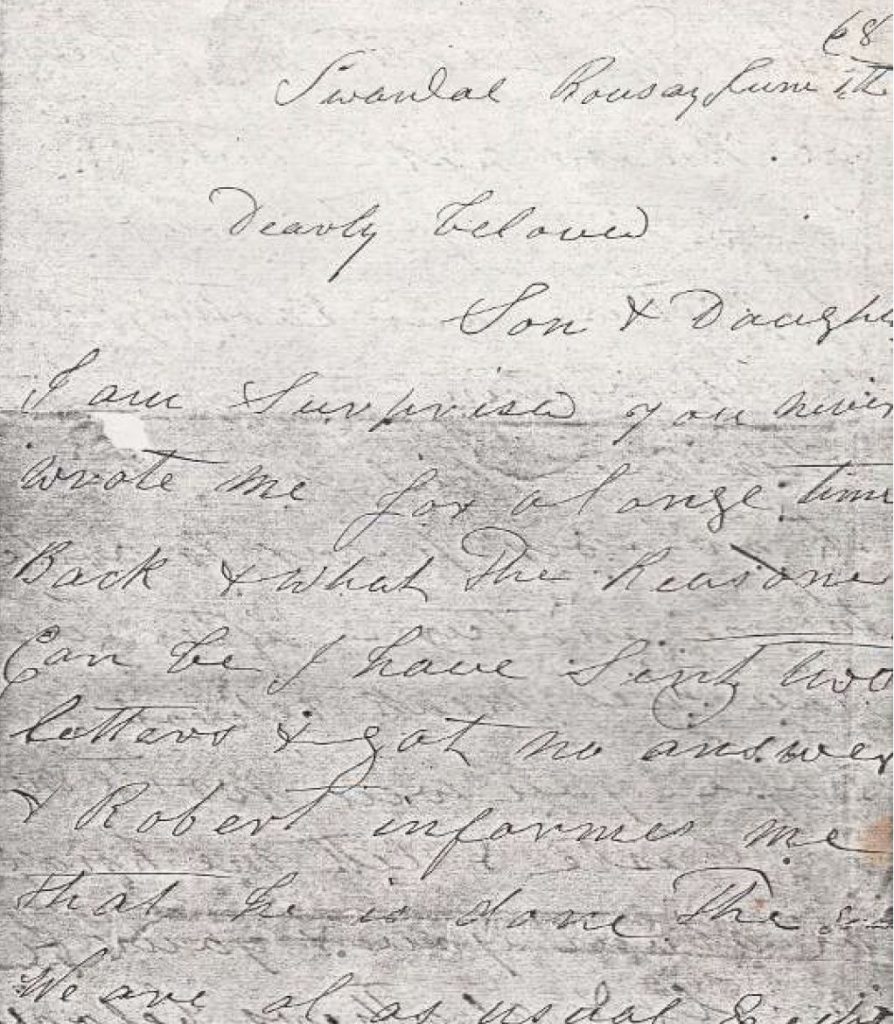
Letter from Robert Sinclair (A606) of Swandale, Rousay to his daughter Margaret Sinclair (A622) and her husband Hugh Marwick (A19) in Australia.
Swandale, Rousay
June 6th 1868
Dearly Beloved Son & Daughter.
I am surprised you never wrote me for a large time back and what the reasons can be. I have sent two letters and got no answer, and Robert informs me that he has done the same. We are all keeping as usual except myself confined over a month with the influence and it has made me very weak. What the result may be we know not, but we know that by the course of Nature our Earthly journey is approaching to an end when we shall not have it in our power to write to one and other.
After giving you this weakness of mine, hope you will write me in haste and let me know all about you and your family and all others belonging to Rousay so far as you know.
A letter from you Margaret would greatly oblige me and your stepmother.
Dearly beloved son, your friends are all well and doing well. Your Uncle John of Ervadale has lost the most of his memory but still keeps quiet and is in good health.
Dear Margaret, your sister has a boy and a girl, healthy stout bairns. We have got no letter from James your brother for 20 months.
If you see Louttit tell him his father allowed me to write you concerning him and that he is surprised that he has forgotten him in the time of his greatest need, not so much as write him.
Dear Margaret, I find you promised to send your portrait but never did.
Dear Margaret, your friends in Stenisgorn, Newhouse, Tratland and Cruesday are all well in health and well to do and no changes either by death or marriage.
You may tell the Gibsons that their father, mother and brother is as usual and doing remarkable in that house so please let us know all about them. And tell Inkster that I have wrote him and never got an answer. Tell him also to write and let me know how he is doing.
James Grieve is going to cod and herring fishing as usual.
Yours with Esteem.
Robert Sinclair
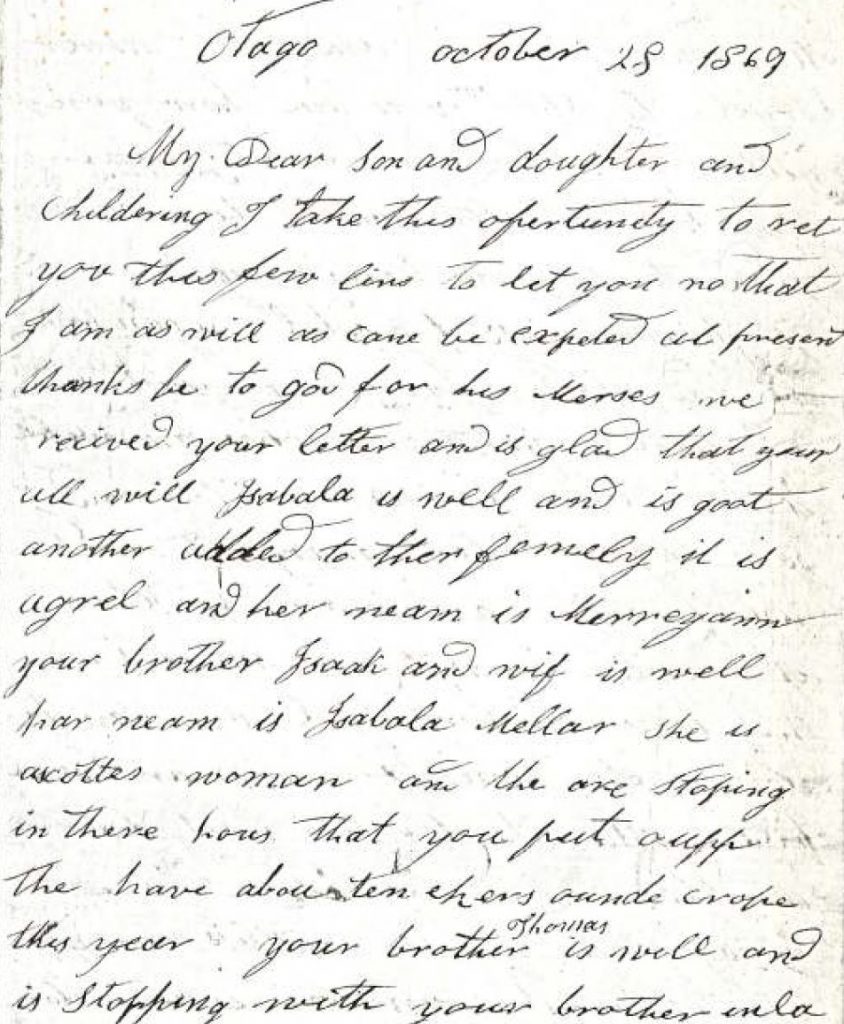
Letter from Thomas Marwick (A4) in New Zealand to his son Hugh Marwick (A19) in Australia.
Otago
October 28, 1869
My Dear Son and Daughter and Children.
I take this opportunity to write you this few lines to let you know that I am as well as can be expected at present, thanks be to God for his mercies. We received your letter and is glad that you are all well.
Isabella is well and is got another added to their family. It is a girl and her name is Mary Ann. Your brother Isaac and wife is well. Her name is Isabella Miller. She is a Scots woman and they are stopping in their house you put up. They have about 10 acres under crop this year.
Your brother Thomas is well and is stopping with your brother in law as grieve. Your sister Ann is well and is in town as a servant. Mr Yorston and wife and family is all well. Their son James is learning for a schoolmaster if he can get the opportunity.
Mr Sinclair Harrold and wife never forgets to speir for you and how you are getting on and why be not coming here. They say they would be very glad to see you here again.
Hugh Marwick of Guidal is gone home. We had a letter from home just now and your brother John and wife is well and doing well, and so is your sister Margaret and family. Your Uncle John of Ervadale is not very well. I hear that he is very forgetful and can do no business himself.
We are having very fine weather here for these last 2 months and it is like to be a dry season here too. Cattle is very cheap here at present. Rootwork is very dole at present too, but we hope things will soon be better.
I am going to send you my portrait to keep in remembrance of me. You will see your brother in law standing along with me. He is my best friend. He is very kind to me. He is as kind as your sister Bella and you know she is kind enough and I want for nought.
I would like to know of John Harrold, how he is getting on, and of John Gibson, how is he getting on, and of Thomas Inkster, how is he getting on, and Mrs Gibson, how is she getting on?
We had a letter from home and all your friends are well at present. But your Uncle of Ervadale he is very forgetful and can do nothing himself unless somebody is with him.
Your brother John is well and family and so is your sister Margaret and family.
I have no more news at present.
I remain your father.
Thomas Marwick
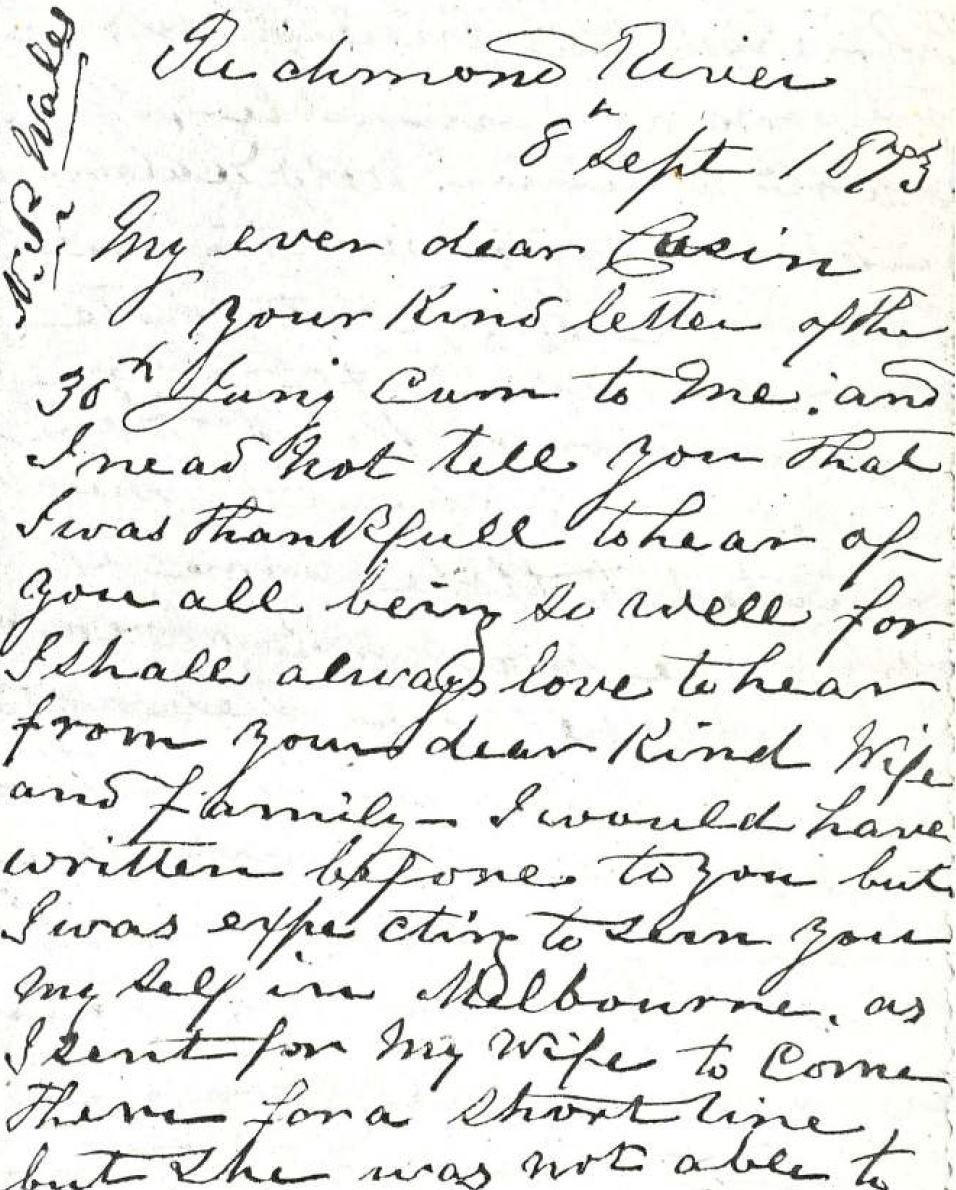
Letter from James Harrold in Australia, on a visit from NZ, to a cousin, probably of the Hugh Marwick (A19) family in NSW.
Richmond River, NS Wales
8th September 1873
My ever dear Cousin.
Your kind letter of the 30th June came to me and I need not tell you that I was thankful to hear of you all being well, for I shall always love to hear from your dear kind wife and family.
I would have written before to you, but I was expecting to see you myself in Melbourne, as I sent for my wife to come there for a short time, but she was not able to take the voyage. So I am to go to her soon now, but shall with God’s help see you and some more of my old friends yet in Melbourne as soon as I am able.
I expect to be in New Zealand in about 4 months time. I do love this part of the world well, for I am found some kind friends in it and I should much want to stop here if my home was not already established on Stewart Island.
I have been through New South Wales and Queensland and admire its fine rivers and inland country, and once I began to know and trade with them I thought long to leave them. I was about 90 miles up this said river and the people is so kind and homely in their way.
You will please to remember me to your Brother and tell him that I shall come out to his place and see him if able, when I see you. Our friends in New Zealand is all well and doing very well I believe.
I hope this will find you well as it leaves me and shall always be glad to hear from you and family. Remember me to your children and do tell your dear wife from me that I shall still think of her will all love and respects for her kind acceptance of me.
I must say farewell just now, until it is the will of God that we shall meet, and am with all love and respect.
Your very true and affectionate friend
J Harrold
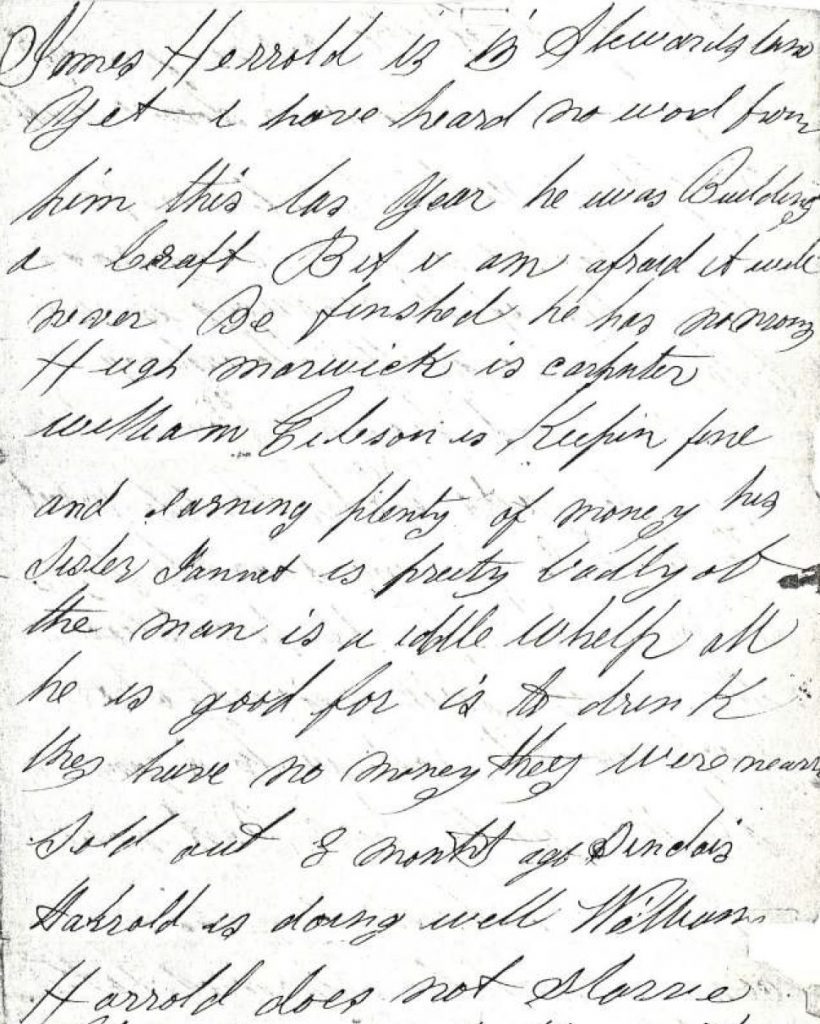
Letter from James Yorston (A59) in New Zealand to his uncle Hugh Marwick (A19) in Australia. First part of the letter is missing. Date unknown, but probably late 1870s or early 1880s.
……….James Harrold is in Stewart Island, yet I have heard no word from him this last year. He was building a craft, but I am afraid it will never be finished as he has no money.
Hugh Marwick is a carpenter. William Gibson is keeping fine and earning plenty of money. His sister Janet is pretty badly off. The man is an idle whelp; all he is good for is to drink. They have no money. They were nearly sold out 8 months ago.
Sinclair Harrold is doing well. William Harrold does not starve. Christ knows he plants not his loaf in the…..(??)…..for himself but shares it frugally with his Mrs and family. All the rest of the Orkney people as far as I know is doing well, except David Trumbton; he is expected to die very soon and all hopes of his recovery is vain.
Otago is a pretty flourishing condition at present. Flour is pretty cheap here. Oats 2s 9d per bushel, wheat 3s to 5s do. Farming scarcely pays a man here, for to hire labour the oats will scarcely clear expenses. The road works is going on pretty well here just now.
If you intend to cross come quickly. Stay not, take up your bed, Mrs and family, make the attempt.
James of Tireola (?) has gone home. He ruined himself in London with his chest and he will not sneeze so bright in Orkney as he expected when he left here.
We have heard no word from home this last 5 years. They are forsaken us.
When you come across, you will remember that tools is cheaper there than here, so you will take a good supply of them with you. I should like very much that you take one or two of them. Affectments for fencing which bores the ground up like an auger (?). I don’t know their name but you will. It would be very handy here for fencing with, as I don’t think there is any of them at this side.
Write and let us know when you get this, when you intend to start and when you think you would be in Dunedin. We would be with the horse and cart to take you out immediately you land.
Walter and family is in good health. He is getting on with his farm.
I have no much news in particular to write you or else I would fill pages to you. I expect to be here and then you will know everything as well as I.
I remain yours affecly
James Yorston
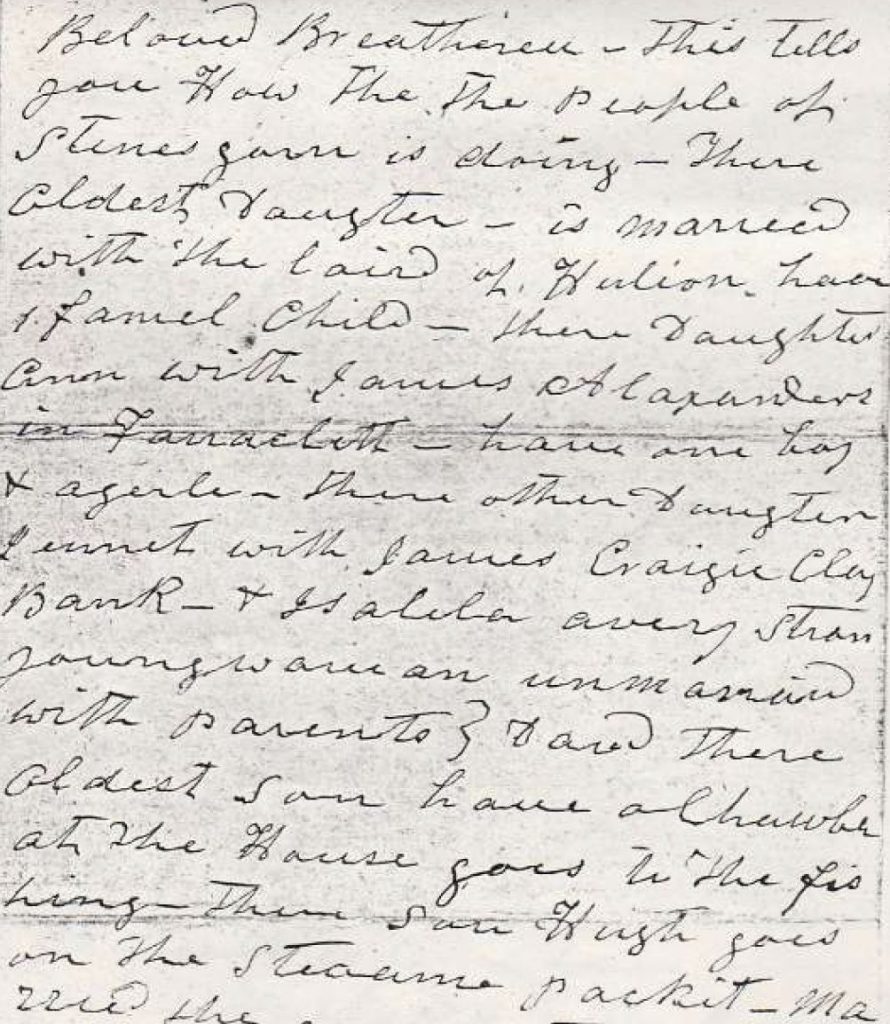
Letter from Robert Sinclair (A606) of Swandale, Rousay to his daughter Margaret Sinclair (A622) and her husband Hugh Marwick (A19) in Australia. Probable Date 1879/1880.
Swandale, Rousay
Beloved Brethren.
This tells you how the people of Stenisgorn (Hugh Sinclair A612 & Isabella Gibson A235) are doing.
Their oldest daughter (Mary Sinclair) is married with the Laird of Hullion (John Inkster Craigie A649).
Their daughter Ann Sinclair with James Alexander (B395) in Faraclett have one boy and a girl.
Their other daughter Janet Sinclair (A282) with James Craigie (A810) of Claybank.
And Isabella Sinclair a very strong young woman unmarried (she m. David Inkster in 1885).
David Sinclair their oldest son goes to the fishing.
Their son Hugh Sinclair goes on the Steamer Packet – married the youngest daughter of Hullion.
Their son James married to Betsy Alexander, went to Edinburgh to an aunt of hers and is stopping with them.
Their son John he is a joiner and works at the house.
Newhouse have only one son (Hugh Sinclair A637) and a daughter (Anne Craigie Sinclair A636). She is married with David Gibson (A242) of Langskaill in a farm in Walls with six girls and one boy. Hugh Sinclair (A637) their son married Maggie McKinlay – no child as yet.
Dear Brethren, this will tire you in reading it but I do it for your amusement for I like news myself. I am obliged to Mr Thomas your son for the wise letter he wrote me – compliments to Thomas your son and family.
I know it would be too troublesome on your part Margaret to ask for your likeness and your beloved husband and little Margaret and any of the rest that have a desire to put it.
Now I conclude, may the Lord work in you all a work of grace for his own namesake.
Your much esteemed father and faithful friend.
Robert Sinclair
Christian Inkster or Sinclair
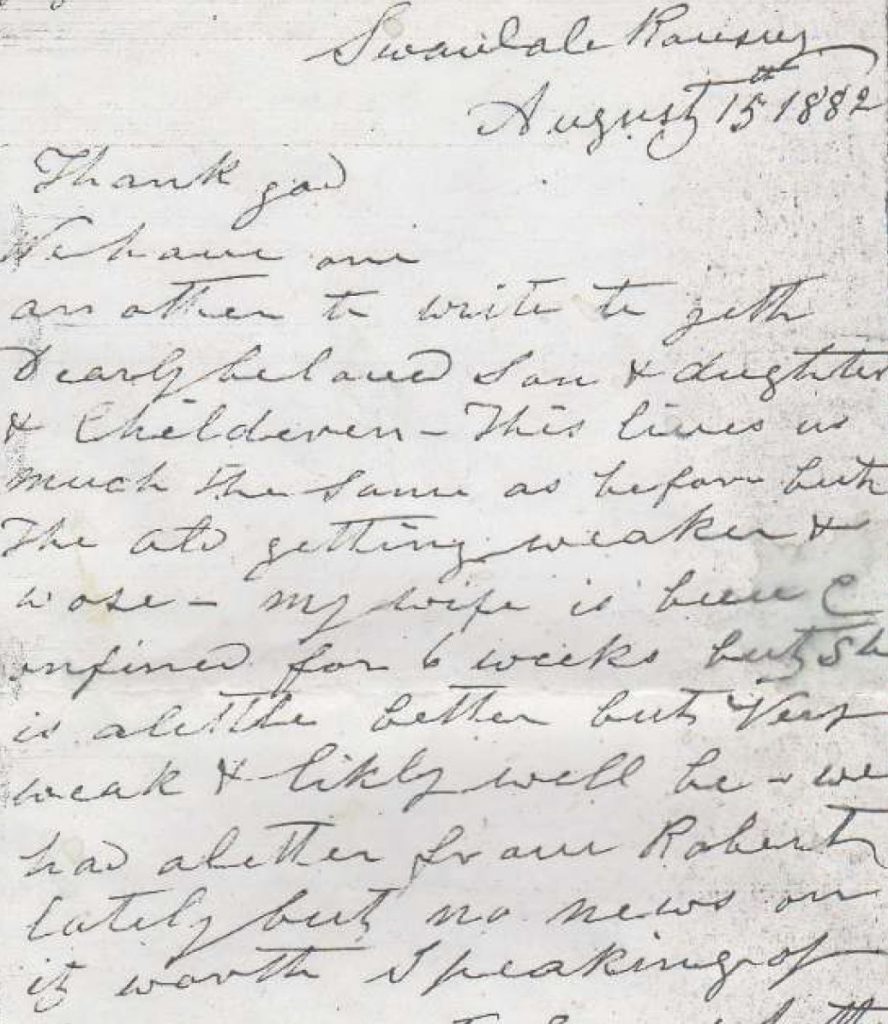
Letter from Robert Sinclair (A606) of Swandale, Rousay to his daughter Margaret (A622) and her husband Hugh Marwick (A19) in Australia.
Swandale, Rousay
August 15th 1882
Thank God we have one another to write together, dearly beloved son & daughter & the children.
This leaves us much the same as before, but the old are getting weaker and worse. My wife has been confined for 6 weeks, but she is a little better but very weak and likely will be the same.
We had a letter from our Robert lately but no news on it worth speaking of. He does not say whether he is to come home and stop. Neither did you learn if he was to marry with anyone there. We heard he was to marry with Harriet Begg, a daughter of one that he stopped with. She came to Orkney some 2 or 3 years ago and stopped with her uncle Mr Calder, Mr Balfour’s factor, until he died. Whether she went away or is still in Orkney I know not.
Robert is getting on and has passed the age forty four mark (May 8th 1882). And if he married and had children, when his eldest child is twenty he willl be sixty four. It is time he had been married twenty years ago. (Robert Sinclair (A628) went to NZ and m. Jane Mutch in 1885 in Dunedin.)
I went to John of Woo (John Marwick A21) to give him a bit of a scolding why he did not write you. Dear Thomas I went to Woo to give him your compliments and wishes to your sister. They seemed to pay no attention to you at all.
Your brother John (A21) had a son whose name is Robert and he has been with Samuel of Bigland since he could do a man’s work. He is in love with a daughter of William Louttit (B8) and her name is Matilda (B14). Leonard of Woo and Bigland does not want him to marry her as her mother is a daughter of old Peter Leonard (B300). I cannot tell you now but if spared I shall tell you afterwards.
If you see John Marwick Craigie’s brother Jim, could you tell him his mother is a poor widow and if he could write her a note it would do her good.
Tell John Harold his father is working on The Loam every day, getting old Alexander Grieve labouring with him when he is not at the sea.
I cannot give you much more news at this time; give me all the news you can.
We ………. all your pictures in safety.
I give a father’s affection for your remembrance of us.
Write soon Dear Margaret. When I write you it takes a tear from your mother’s eye.
Yours truly
Robert Sinclair
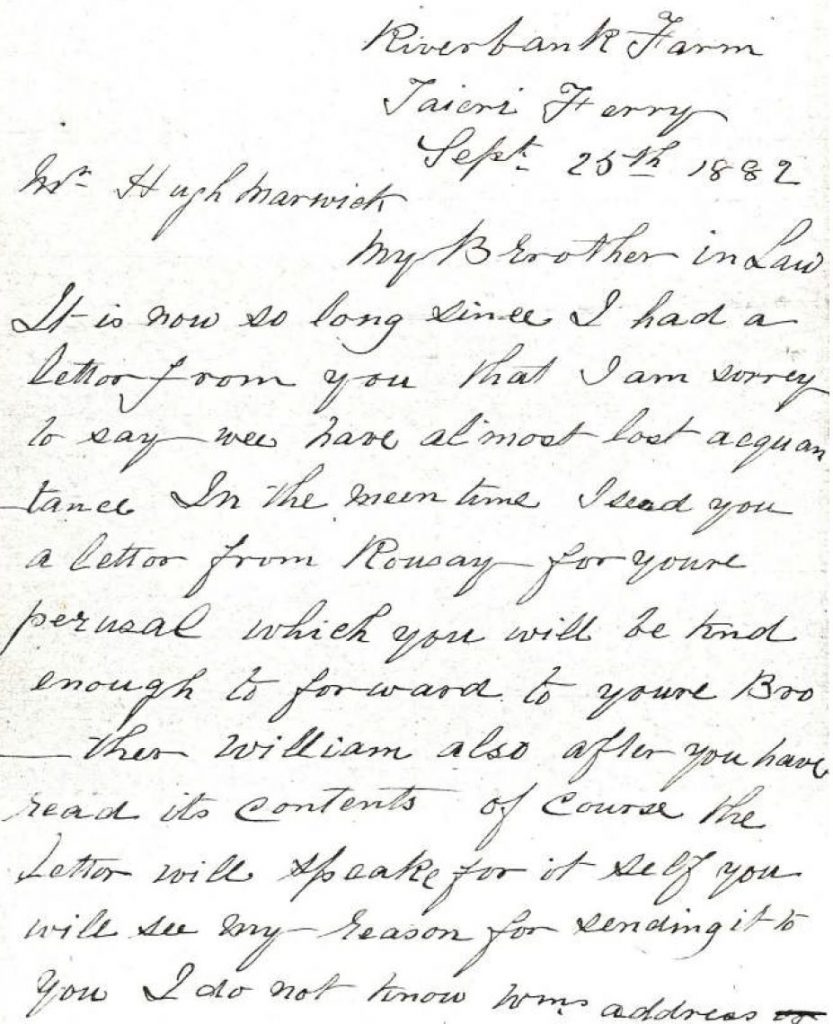
Letter from Richard Craigie (A827) in New Zealand to his Brother in Law, Hugh Marwick (A19), in Australia.
Riverbank Farm
Taieri Ferry
Sept 25th 1882
Mr Hugh Marwick,
My Brother in Law It is now so long since I had a letter from you that I am sorry to say we have almost lost acquaintance. In the meantime I send a letter from Rousay for your perusal which you will be kind enough to forward to your Brother William also, after you have read its contents of course. The letter will speak for itself. You will see my reason for sending it to you. I do not know William’s address or I would write to him. But I trust you will do that for me.
My family is all well at present. All your friends here is in good health. Your brothers Thomas and Isaac is stopping with us at present.
My three oldest boys is now working our farm. They are growing tall 6 feet and 13 stone weight.
A few lines from you at your convenience would be gladly received. My wife wants to be remembered to you and Mrs Marwick. If William Yorston is near to you, tell him I would be glad to hear from him.
Yours Respectfully
Richard Craigie
Taieri Ferry
Henley P.O.
Otago
NZ
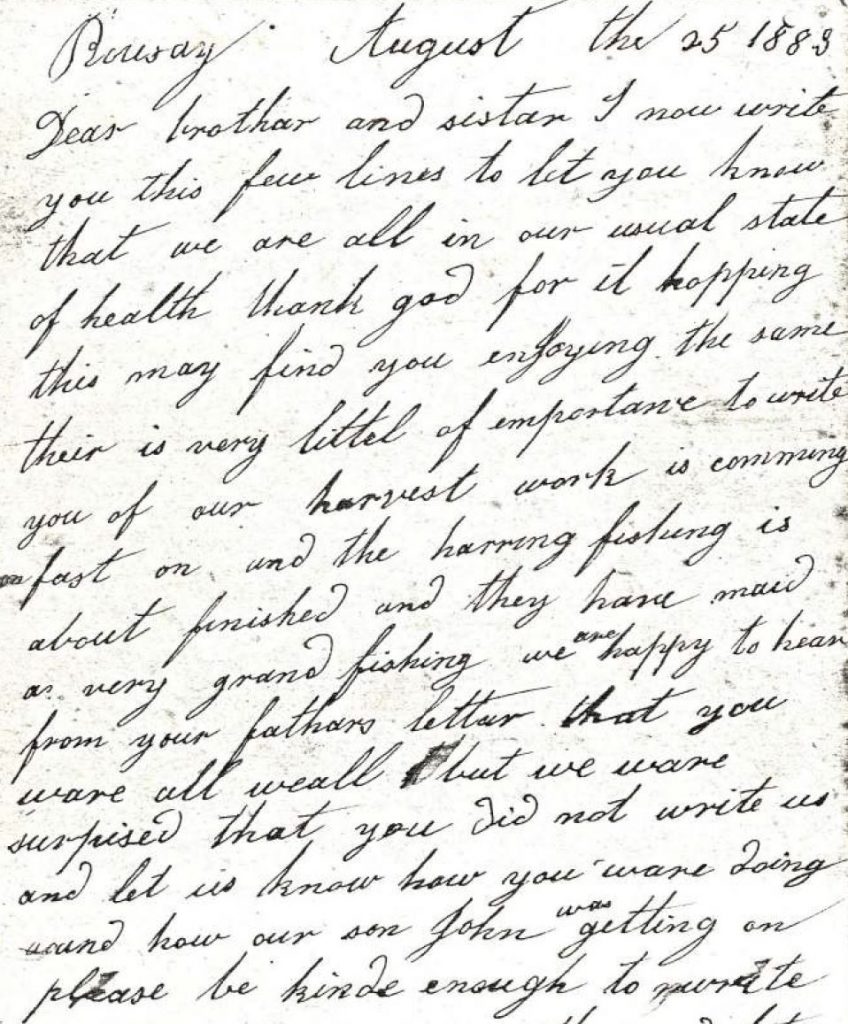
Letter from John Craigie (A819) and his wife Betsy Sinclair (A625) in Rousay to Hugh Marwick (A19) and his wife Margaret Sinclair (A622) in Australia.
Rousay August the 25th 1883
Dear Brother and Sister.
I now write you this few lines to let you know that we are all in our usual state of health thank God for it, hoping this may find you enjoying the same. There is very little of importance to write you of. Our harvest work is coming fast on and the herring fishing is about finished and they have made a very grand fishing.
We are happy to hear from your father’s letter that you were all well, but we were surprised that you did not write us and let us know how you were doing and how our son John was getting on. Please be kind enough to write as soon as you receive this and let us know how John is getting on, for he has given his mother very much uneasiness concerning him, as he never thinks of writing her to let her know whether he is dead or alive. Please let us know what his employment is, if he is able to do any work, or is he in the hospital.
You mentioned in your letter that he visited you frequently, but you never said what his employment was and (what) he has been doing since he came to Melbourne. Please do your utmost to get him to write a few lines to his poor mother. If he is still out of health we think that he would be better to come home as it appears he is not keeping his health in that country.
When you write, let us know how all your family is employed and how all the Rousay people is getting on. Betsy wishes her sister Margaret to write a few lines herself to her and let her know all the particulars concerning herself.
No more at present, but remain your affectionate Brother and Sister till death.
John and Betsy till death.
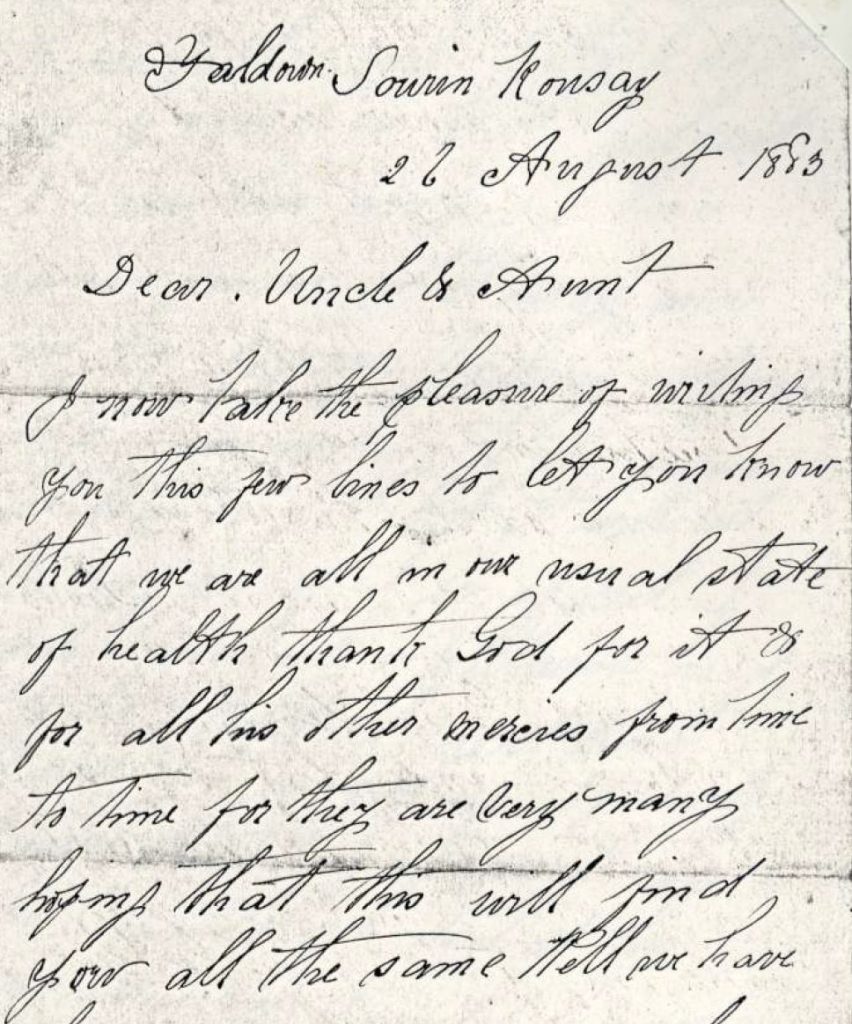
Letter from David Craigie (A657) in Rousay to his aunt Margaret Sinclair (A622) and her husband Hugh Marwick (A19) in Australia.
Faldown, Sourin, Rousay
26 August 1883
Dear Uncle & Aunt.
I now take the pleasure of writing you this few lines to let you know that we are all in the usual state of health thank God, for it is for all his other mercies from time to time for they are very many. Hoping that this will find you all the same.
Well we have had a very fine summer here this year, so for as yet, and it is looking to be a very fine harvest and the crops are looking fair.
My Grandfather received your letter last night and saw that you were all quite well and my mother wished me to write now and see how my brother John Harrold was. Thomas said in his letter that he came up to your house occasionally and we would like to know where he is making his abode and if he is working, and what he is working at. Mother thought that he is unwell and that he is stopping in the hospital. Has he been working at any work since he went to Australia or not, so I hope John will try and get his heart softened and see if he will not write a few lines home to his mother. Well, I think that will be enough on that subject.
I have been serving a time for a joiner in Rousay and now my apprenticeship is finished and I am working to the same old Master yet, but it will not be long now if I be spared. I wish I was only in Melbourne beside my old Aunt. I don’t think I would be so hard up. If I only could save half as much now as Cousin Hugh did at his apprenticeship I would be very contented. We are working in Rousay here for 10s a week and if we had no other help that would not keep us.
My father is writing a piece to you too and it is no use to me to give you more news. The fact is I have no more to write of, but be sure when you write to tell all my cousins to put in a bit since it is the first time that we have ever spoken to one another and I would like very well if your youngest daughter would put home her likeness then I will put off mine.
Since I have gone home, Uncle Samuel’s wife and family is stopping in our house at present.
Now I think since my paper is getting little I will be as good to say goodbye. With best wishes to Uncle and yourself and all the family and also brother John.
No more but remains
David Craigie
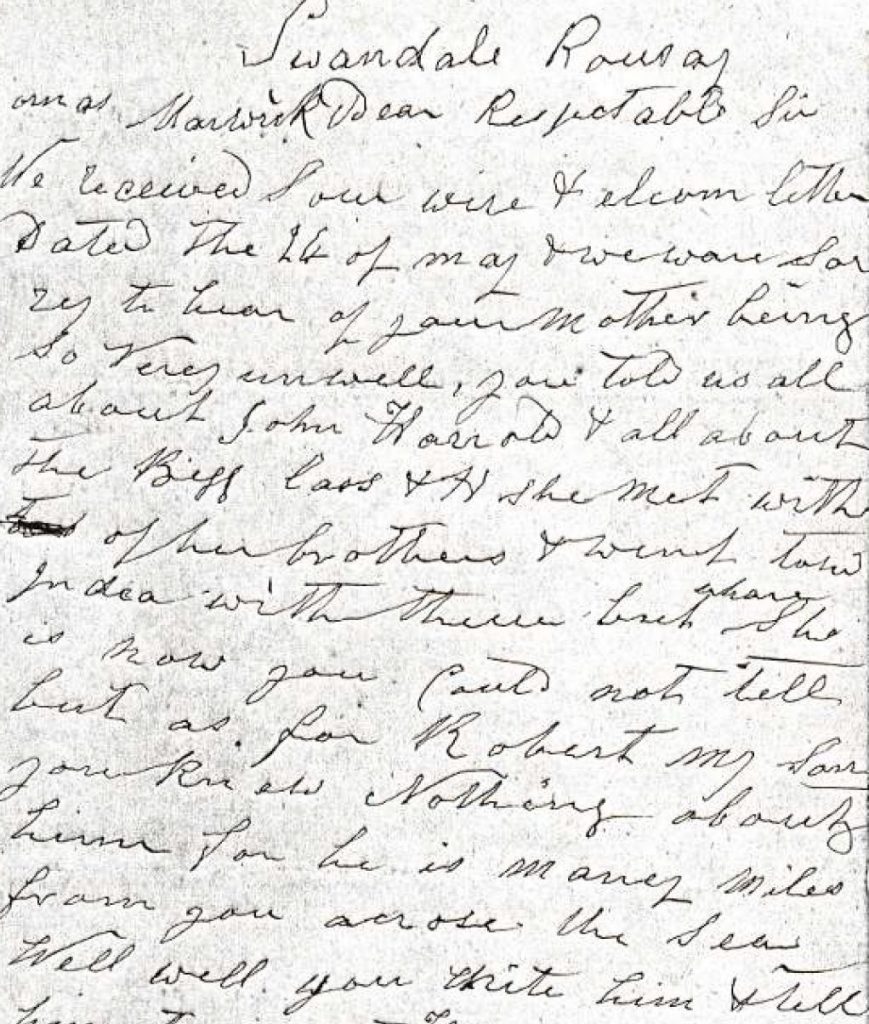
Letter from Robert Sinclair (A606) of Swandale, Rousay to his grandson Thomas Marwick in Australia, son of Hugh Marwick (A19) and daughter Margaret (A622). The date is probably 1883/1884.
Swandale, Rousay
Thomas Marwick, Dear Respectable Sir
We received your wise and welcome letter dated the 24th May and we were sorry to hear of your mother being so very unwell. You told us all about John Harrold and all about the Begg lass and how she met with two of her brothers and went to see India with them. But where she is now you could not tell.
But as for Robert my son (A628) you know nothing about him for he is many miles away from you across the sea (in NZ). Well, well, you write him and tell him to write to his parents that we may know where he is and what he is doing.
From us all together I hope you will excuse my bad writing for my hand shakes.
We have news of some help. We fall down sometimes and must be carried in to get some refreshment to make us better. Then it may be a day or two before the old wife and me get out of bed again.
I hope you will tell Robert my son to write by the first Mail and tell us all about himself.
Our daily support is from Hugh [youngest son]. Chiefly we do get what he thinks is good for us God bless him and do him good.
I cannot give you a long letter at this time for I am tired of writing.
Your obedient servant
Robert’s affectionate father and mother until death.
Robert Sinclair
Christian Inkster (Mrs Sinclair)
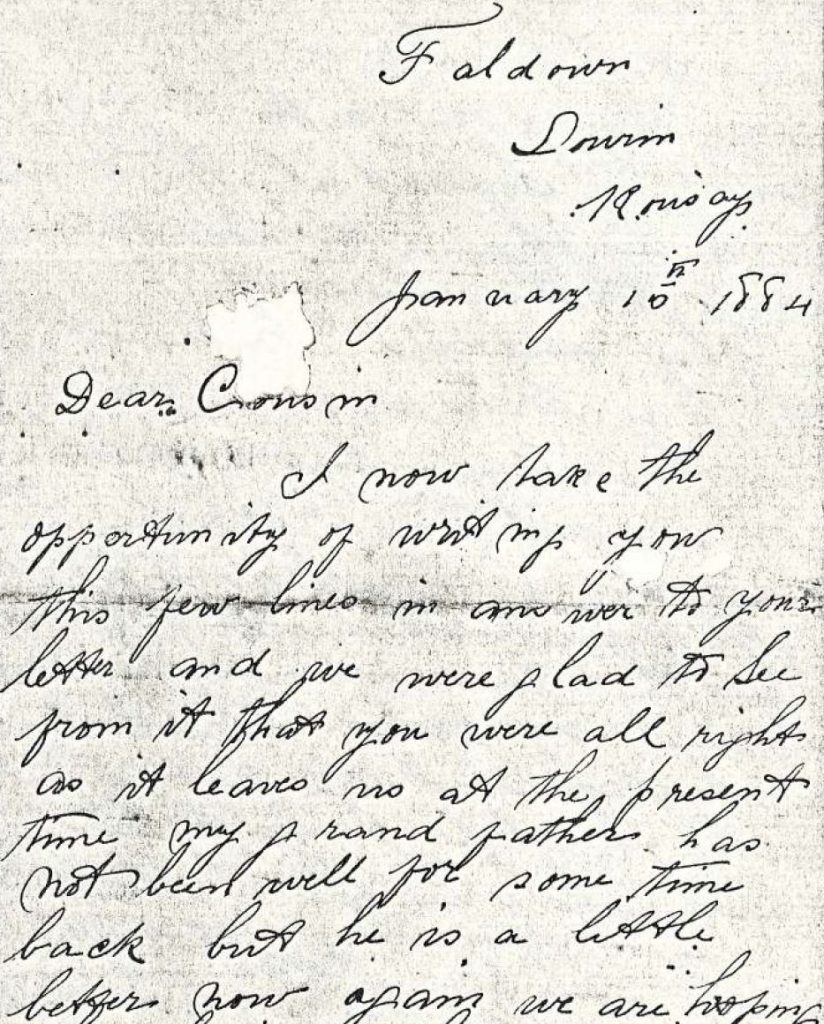
Letter from David Craigie (A657) in Rousay to his cousin in Australia, probably Hugh Marwick, son of Hugh Marwick (A19).
Faldown, Sourin, Rousay
January 10th 1884
Dear Cousin
I now take the opportunity of writing you this few lines in answer to your letter and we were glad to see from it that you were all right as it leaves us at the present time. My grandfather has not been well for some time back but he is a little better now again. We are hoping that he is on the recovery again.
We have had a fair Winter here this year, very little snow fell. We had a very beautiful New Year’s Day here this year and a very happy one. In the morning I went to Swandale, then Uncle Hugh and me went across to the island of Egilsay and spent most of the day there. And in the evening we came back again and I went to Scockness to a dancing which was at night.
Your mother will know about that house when she hears about it. My sister Christina is stopping in it. My youngest sister is still going to the school. She is in the 6th Standard. She is not going longer or this quarter.
I had a letter from James Tulloch yesterday and he said on it that he had received one from Cousin Hugh just before and he said that John Harrold was got down to you from the sheep shearing.
That was very glad news to my mother to hear from him that he is well. He says that he is going out again in 5 weeks. I am also thinking to go out with him if I can get ready. I was in his house in Shapinsay a night after he came home and he gave me lots of news about Australia and New Zealand.
You can tell your mother that she put my mother in a bad state about that rings which you put home with Tulloch. She thought that one of them was to her and so did he. For you said that it was to my sister so she thought that it was to her and she was very proud. It would only go on her little finger so she had it keeping till Swandale got that letter which told them that the ring was for Mrs Stevenson. When my mother heard of it she was very vexed so we put it over to her.
My mother has got a coat wrought for your mother of her own sheep. If I come off I will have it with me and if not we will put it with Tulloch.
I got that cards and papers which you sent. Mother thought Aunt was very well like still. You can tell your sister that I was very glad to get her card.
I have nothing of any importance to write you about at present. I will write you again before I start. Give my best wishes to all inquiring friends not forgetting yourself.
Yours truly
David Craigie
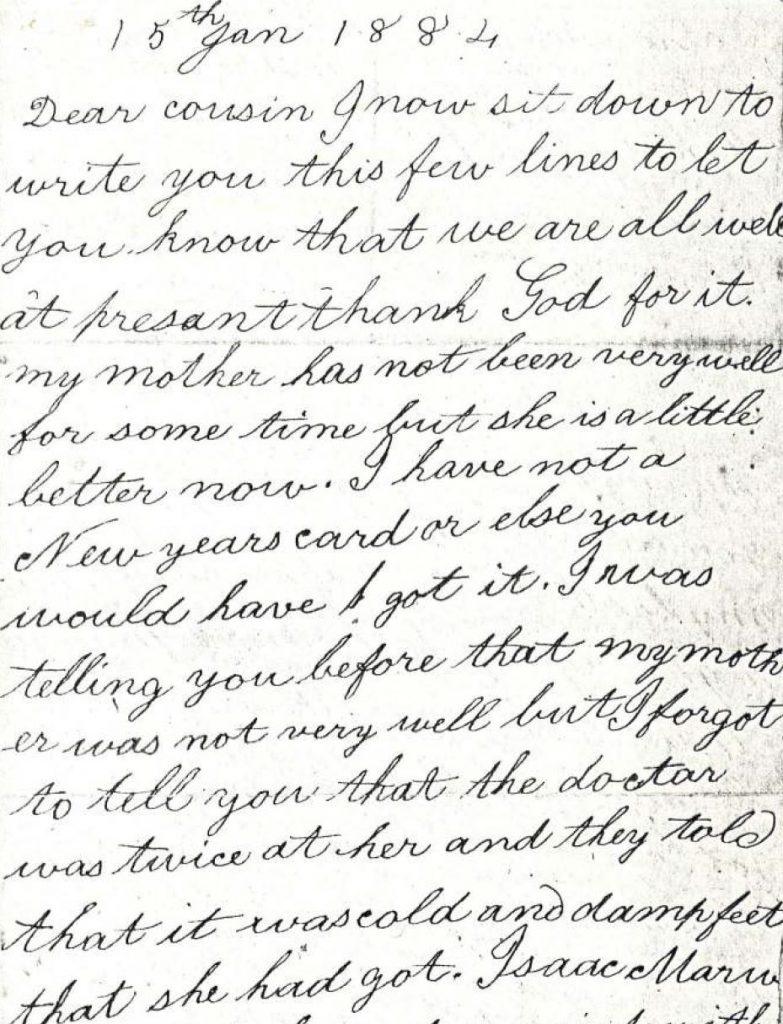
Letter from Elizabeth Craigie (A658), age 13, in Rousay, to her cousin Margaret Marwick in Australia, daughter of Hugh Marwick (A19) and Margaret Sinclair (A622).
15th Jan 1884
Dear Cousin
I now sit down to write you this few lines to let you know that we are all well at present, thank God for it. My mother has not been very well for some time but she is a little better now.
I have not a New Year’s card or else you would have got it. I was telling you before that my mother was not very well, but I forgot to tell you that the doctor was twice at her and they told that it was cold and damp feet that she had got.
Isaac Marwick of Essaquoy has got married with a daughter (Sarah) of John Harrold this year. David is sitting here and he will not let me alone. Jane and Thomas Sinclair of Swandale is still going to the school. Jane is in the fifth std and Thomas is in the second std. Grandmother is wearing three gold rings on her fingers.
I am going to enclose my letter with some of my hair and you must send me some of yours. You will tell me how John (Harrold) my brother is and if he has got all right again. Tell your mother to write to my mother a few lines because she thinks that she is forgot all about her and she wants to know the reason. Grandfather has been very unwell for about two month and has hardly been out of his bed.
You must write to myself and not to David. Give my best respects to uncle and aunt.
I am yours truly
Elizabeth Craigie
To Margaret Jane Marwick
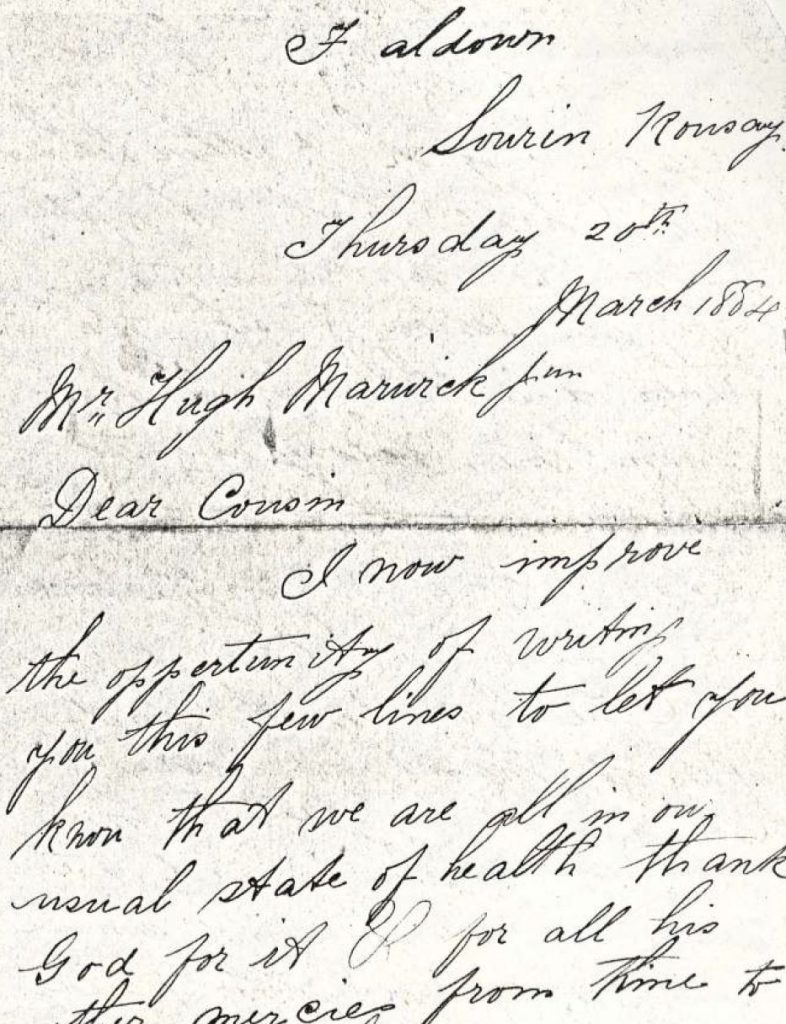
Letter from David Craigie (A657) in Rousay to his cousin Hugh Marwick in Australia, son of Hugh Marwick (A19) and Margaret Sinclair (A622).
Faldown, Sourin, Rousay
Thursday 20th March 1884
Mr Hugh Marwick jun.
Dear Cousin
I now improve the opportunity of writing you this few lines, to let you know we are in our usual state of health thank God, for it is for all his other mercies from time to time for they are very many. Hoping this will find you the same.
We have had a very awkward Winter here this year of very high winds and rain. It has kept the work rather behind, but I hope that it will soon be taking a change for the better.
Just the other day there was 2 well known men belonging to the island [William Louttit, Lower Blackhammer, and John Kirkness, Grain] that was going across to Evie for the Doctor. It came a breeze of wind and the boat upset and both of them were lost. It has put a great gloom over the whole island. They left their widows and small families.
Your brother said in his last letter that he was going to get brother John to write home, but we have seen none.
Well Hugh, I intend coming off to your place with the mail steamer (The Orient) along with the Tulloch men. We will leave London on the 16th April so I would be very much obliged if you would try and meet the Steamer when she comes for I will be no ways aquaint when I come there. And if you would also tell John Harrold I would like very much to see him also. We would have left a fortnight sooner but I had a letter from Tulloch yesterday and his sister in law has not been very well and was not very able to take a sea voyage, so they put it back 2 weeks. James Tulloch is not going at this time but 2 of his brothers is going. It will be company on the ship for me.
My mother has not been very stout of the winter and she is not well yet. My old Grandfather died and Grandmother I don’t think that it will be long that she will trouble anyone neither.
I will have to be drawing to a close now as I have nothing more of any importance to tell you of. Give my best and kindest wishes to all inquiring friends not forgetting yourself.
I remain your affectionate cousin till Death.
David Craigie
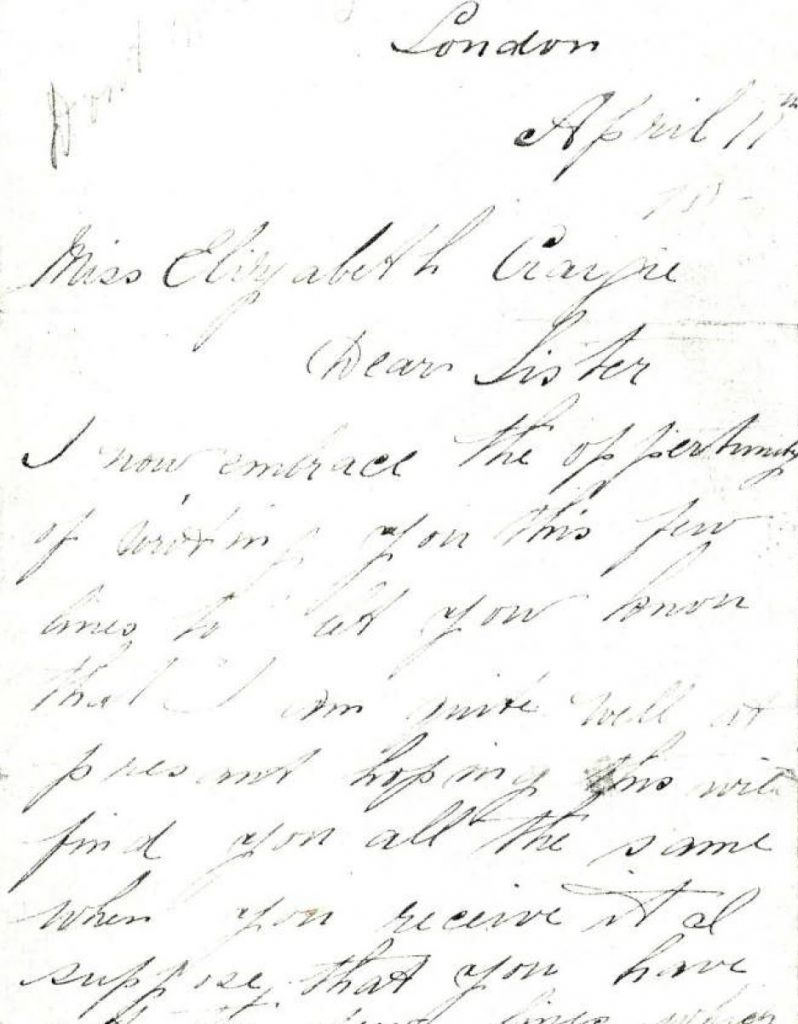
Letter from David Craigie (A657) in London, while on his way to Australia, to his sister Elizabeth (A658), (age 13) in Rousay.
During the voyage 21-year-old David died of heatstroke as the ship passed through the Red Sea.
London
April 11th 1884
Miss Elizabeth Craigie
Dear Sister.
I now embrace the opportunity of writing you this few lines to let you know that I am quite well at present, hoping this will find you all the same when you receive it. I suppose that you have got the few lines which I wrote in Aberdeen.
We did not start the time that I said in the letter which I wrote home, but the ship was delayed for 12 hours in Aberdeen and I can assure you that we were not sorry for that because we had a very fine view of the town. We went into a music hall that evening. It was just about as fine a sight as ever I saw. It was a very fine ornamented room and then there was 2 most beautiful girls came out and danced to the music and they could do it.
We arrived in London this day at 12 o’clock noon. It was a very fine sight coming up the River Thames. The wheat was all growing about the river banks and when we came into the pier there was a man all ready for taking up our chests and luggage. And now we are stopping with him for the time that we will be in London. We pay 2/6 a night for 5 nights that is bed and board. It was the cheapest that we could get.
I will have plenty of money to do me. I bought a waterproof coat in Aberdeen and now I am as well fitted up as any of my companions. I am enjoying myself very well. We had a very fine passage from Aberdeen to London. I felt no sickness.
You can tell Mother that I finished my hen, but that I will have cheese to last me to Melbourne.
Well Dear Sister, I am sure I do not know what more I will write you about, because everything is new to me and I am not acquainted with it.
Tell Mother that I would like an oat bannock and a sap of sweet milk now fine. But that is not to say that I cared for milk and the white bread well enough.
You will have to excuse me for bad writing, for I am in a hurry for my dinner.
The black cow will not be calved yet. I should think that her time will now be up.
Give Uncle Tom and Mary my best wishes and all the little ones. Tommy would not shake hands with me before I left. He said ………. but he will shake hands with ………. of Swandale. I am going to write him the next night as I don’t have any time just now.
I will write Father and Mother before I start. Ask Christina if she got her letter all right.
I am your affectionate brother till Death.
David Craigie
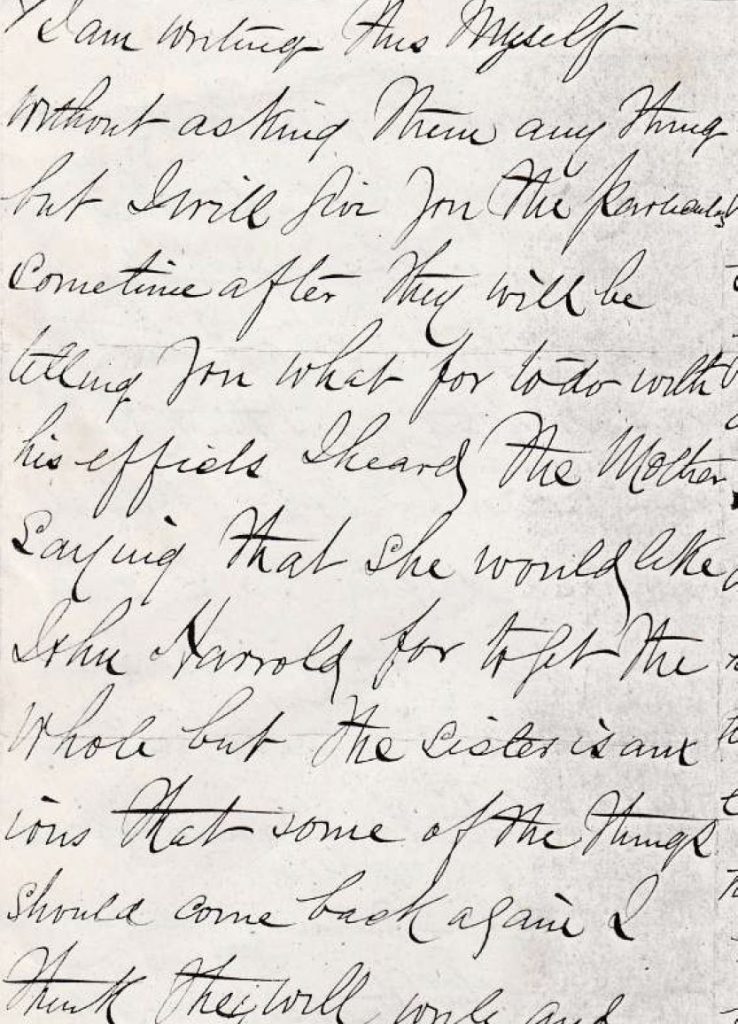
Part of a letter from Hugh Sinclair of Swandale, Rousay to his half sister Margaret Sinclair (A622) in Australia regarding the recent death of their nephew David Craigie. The date is probably June/July 1884.
…..I am writing this myself without asking them anything, but I write for you the particulars. Some time after they will be telling you what for to do with his effects. I heard the mother saying that she would like John Harrold for to get the whole lot, but the sister is anxious that some of the things should come back. Agan I think they will write and tell you all about it when they recover from their great trial.
David was a very fine lad and I had a great liking for him myself. He just made as homely on Swandale as I did. He had a very lightsome turn about him, and as I have heard ever so many say, that he about the best natural lad that ever they saw. I hope that it will all be for his good and that he will be in a better land than Australia.
Your mother is keeping middling and has thought rather lonely since father died, but still she is wonderful mulling putting a headstone to the remains some time soon. The ones in the churchyard are of free stone and cost about £3, but I would have an inclination of having one of granite stone. They are made either in Aberdeen or Peterhead. Aberdeen’s is of a reddish colour and Peterhead’s of a grayish colour.
Your daughter will find one from your sister. There are two pairs of fancy socks, one each for your two sons. I think it is all ticketed. I think there were two pairs for John Harold wrought and given by his sister. There were also I think two pairs of common ones, wrought and given by his grandmother. If the fancy ones are not ticketed I am sure of one pair of them for they were wrought the rock pattern and not another pair in the chest the same…..
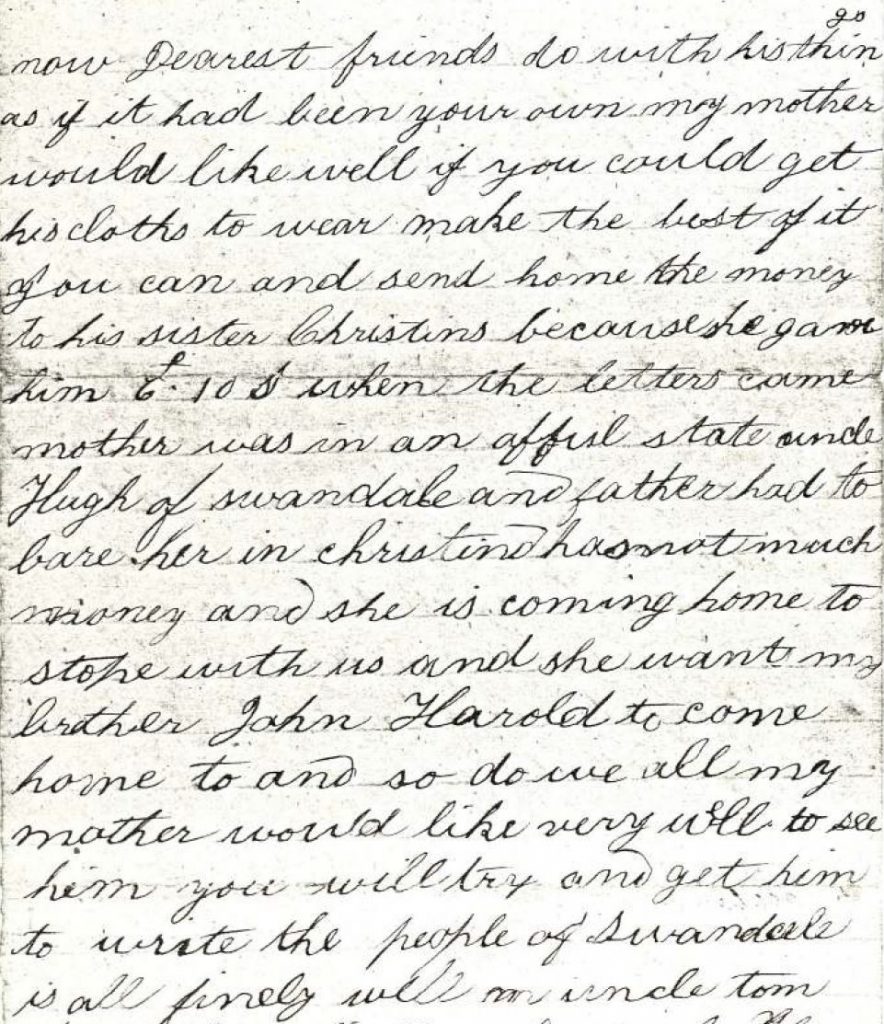
Letter from Elizabeth Craigie (A658) in Rousay to her uncle and aunt in Australia, Hugh Marwick (A19) and Margaret Sinclair (A622). The probable date is late 1884 after the death of Elizabeth’s brother David Craigie on 6 May 1884 during the voyage to Australia. – The first part of the letter is missing.
……….Now Dearest friends, do with his things as if it had been your own. My mother would like well if you could get his clothes to wear make the best of it you can, and send home the money to his sister Christina because she gave him £6 10s.
When the letters came mother was in an awful state. Uncle Hugh of Swandale and father had to bear her in. Christina has not much money and she is coming home to stop with us and she wants my brother John Harrold to come home too, and so do we all. My mother would like very well to see him. You will try to get him to write.
The people of Swandale is all finally well and Uncle Tom has got a little baby. Uncle Hugh has been a true friend to us. He was in a great distress about David and said they were not a brother he loved like him. He gave him £5 in a present when he went off to buy a watch with and he gave Christina her blacks. Christina was in an awful state when we got the news. They had to cart her home and she was beside my mother one week. We are afraid of her that sets down on to lungs.
I will have to be drawing to a close for I have to go out with the cow. Tell Margaret Jane to write a letter to her cousin Elizabeth.
No more at present but remaining your affectionate cousin till death.
Elizabeth Craigie
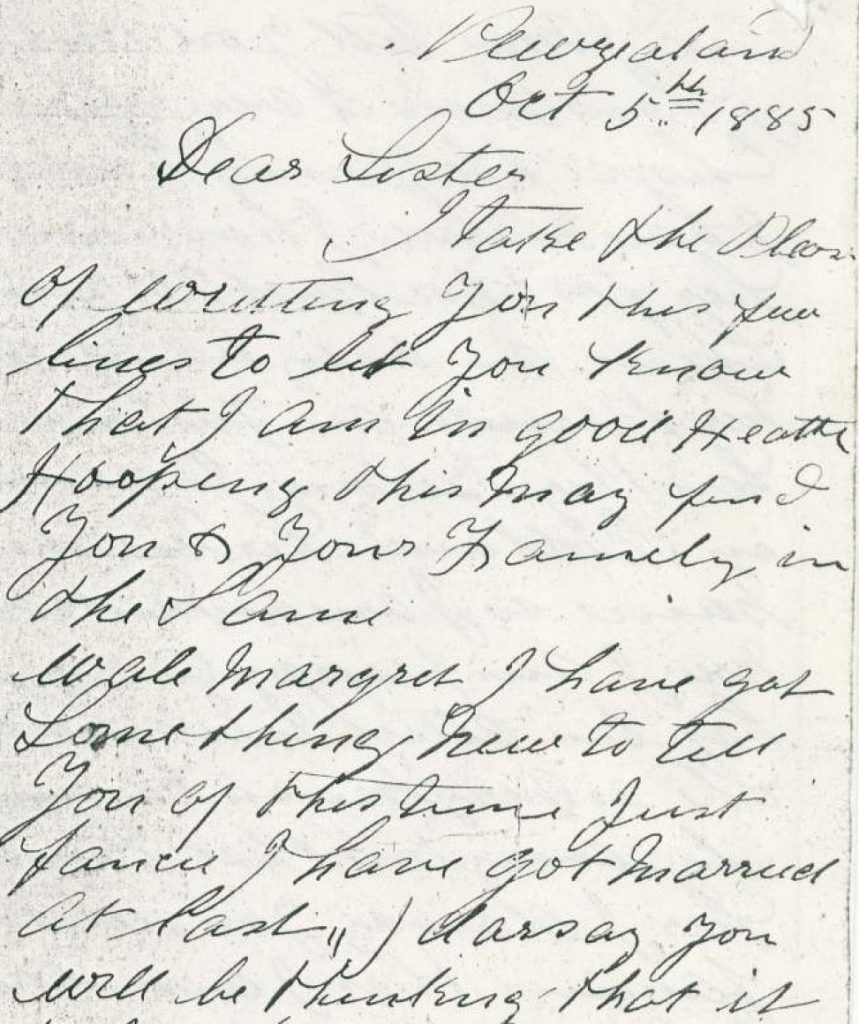
Letter from Robert Sinclair (A628) in NZ to his sister Margaret Marwick (A622) in Australia.
Puerualand
Oct 5th 1885
Dear Sister
I take the pleasure of writing you this few lines to let you know that I am in good health. Hoping this may find you and your family in the same.
Well Margaret, I have got something new to tell you of this time. Just fancy, I have got married at last. I daresay you will be thinking that it is not before time, but better late than never. At least I think so myself and I may tell you that I have made a very good choice. The young lady I have married I have known her for this last 20 years. She is an only daughter. Her parents are farmers here and they belong to Aberdeen in Scotland. Her maiden name is Jane Ann Mutch, now I am happy to say has been altered to Mrs Sinclair. She is very much esteemed by everyone that knows her.
I daresay you will be fancying that I am like to the rest of old fools getting married to some young thing about 18 or 20 years old. But such is not the case. She is 32 years old. So you see that we are not so very badly matched. [Robert was 38 years old when they married]. I think that she is very much about your own size, as far as I can recollect of you. She sends you one of our photos, also some of the cattle.
I made the final plunge last month. We were married on the 15th of September in Dunedin by the Rev Doctor Stewart and I can assure you that I am not regretting the step I have taken because I have got a good partner throughout life.
I just fancy I can see little Hugh laughing when he hears of this wonderful event. I wrote him some months ago but did not mention anything about it to him. I am surprised that he has never answered my letter.
Now Dear Sister I must conclude. Jane joins with me in sending her kind love to you all. No more at present.
Your affectionate Brother and Sister, R & J A Sinclair
Address:
R Sinclair
c/o Mrs Wm Paterson
Puerua
Otago
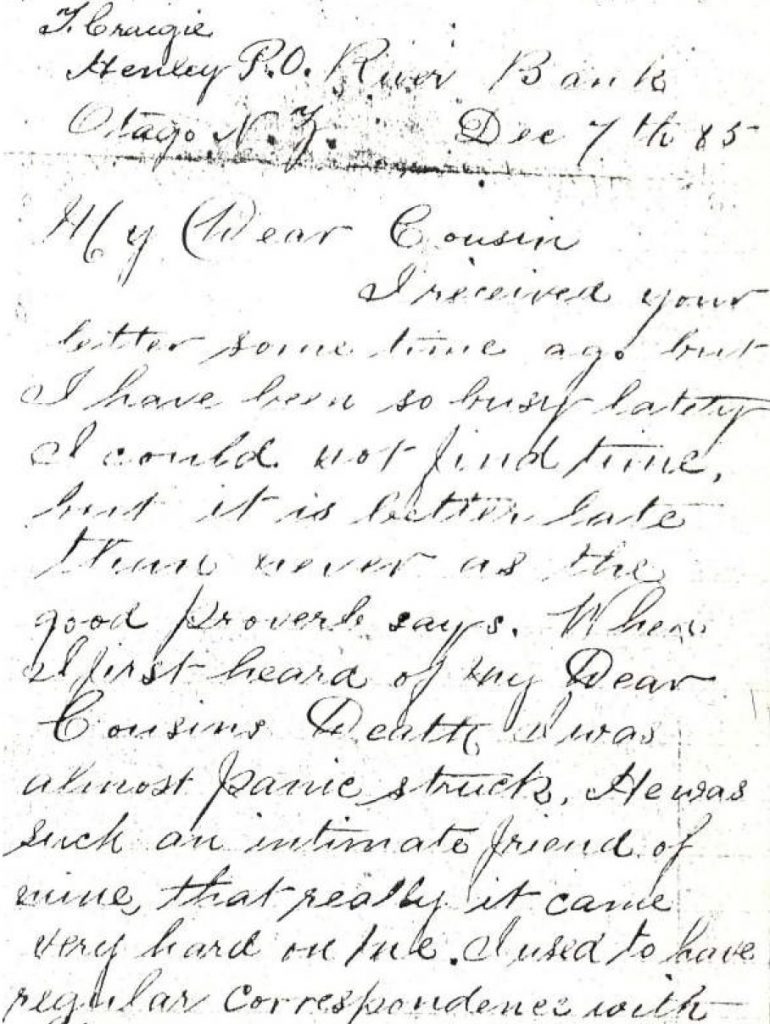
Letter from Thomas Craigie (B32) in New Zealand to his cousin Thomas Marwick, son of Hugh Marwick (A19), in Australia.
Henley P.O. River Bank
Otago, N.Z. December 7th 1885
My Dear Cousin.
I received your letter some time ago, but I have been so busy lately I could not find time, but it is better late than never as the good proverb says.
When I first heard of my Dear Cousin’s death (Hugh Marwick), I was almost panic struck. He was such an intimate friend of mine that really it came very hard on me. I used to have regular correspondence with him and we used to write each other very jolly letters too. But everything must come to an end. He was very warmly welcomed over here by everybody who knew him and his Death was deeply regretted by all who knew him. However, it is all over now and we can only hope to see him at our own Call.
The weather here has been excellent for some time back and the crops are looking well. The heat here has been very great, more than it has been for some time back. I see by the papers it has been very warm over with you too.
I received the papers which you sent me all right and I can only thank you for being so kind to send them. And I am still thankful that I have still somebody to correspond with. I know the death of your Dear Brother must have been a dreadful stroke to you, but I hope you will get over it all right.
How is Will Yorston getting on now. I never hear from him at all. I suppose he is busy sheep-shearing now. The shearing over here is in full swing now, but wages are very cheap this year. A lot of the run-holders clubbed together and it was decided to bring it down from 16s 8d a hundred to 12s 6d, but really it was not fair. Wool has been selling at 6d a pound over here, and as wool was so cheap that’s how wages was reduced. We are going in for stock now more than cropping.
The Yorstons and Sinclairs are all enjoying good health at present and Thank God we are all doing the same. I hope that through our correspondence we will get more intimate and I shall be able to write a longer letter next. Well I must conclude with best respects to all and not forgetting yourself.
I remain your affectionate Cousin
Thomas Craigie
To Thomas Marwick
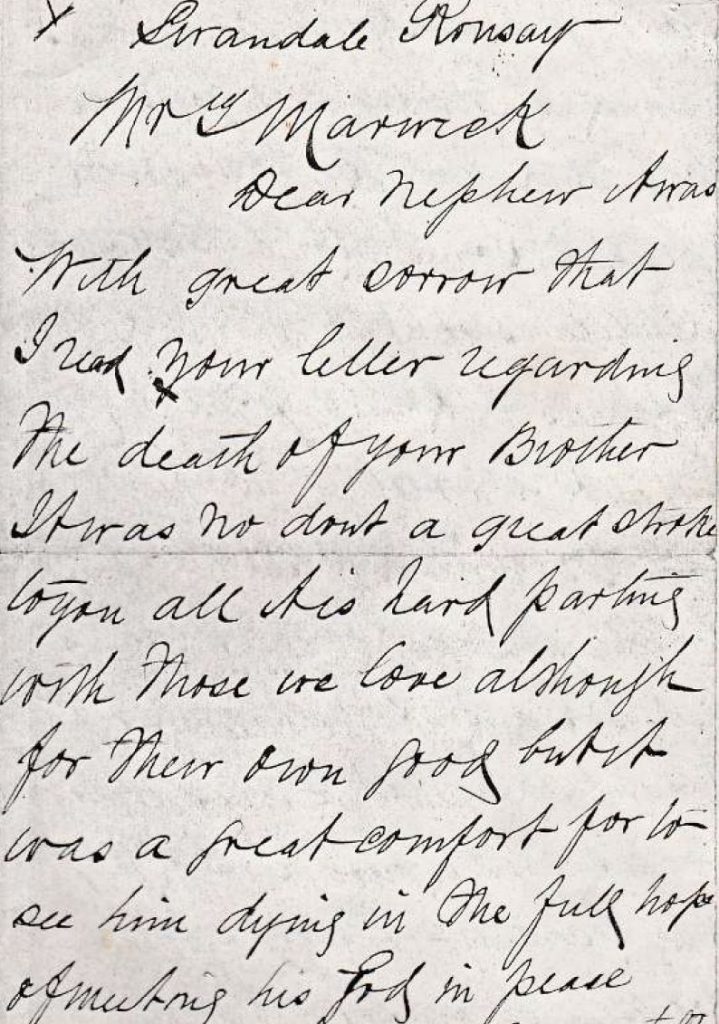
Letter from Hugh Sinclair of Swandale, Rousay, to his nephew Thomas Marwick in Australia, son of Hugh Marwick (A19) and daughter Margaret (A622). The date is probably 1885/1886.
Swandale, Rousay
Mr T Marwick
Dear Nephew
It was with great sorrow that I read your letter regarding the death of your brother (Hugh Marwick d. 1885). It was no doubt a great shock to you all his hard parting with those we love although for their own God. But it was a great comfort for to see him dying in the full hope of meeting his God in peace.
Dear nephew, you may tell your dear mother, father and sisters that we all sympathise with you in your affliction. I may tell your mother that her sister (Betsy Sinclair A625) got as great a shock when she got the news of the death of her son, and now her dear husband is laid aside and there is no hope of his recovery. The disease is a very bad one, a cancer on the back bowel, so you see what trouble some is born to.
They have daughters, one (Christina Craigie) is I believe about to get married to a William Grieve, second son of Robert Grieve that was in Furss. He has been some time out in America. She is 24 years of age and the other one (Elizabeth Craigie) is 14. She will be a great comfort to her mother.
They built a nice house on Faldown a few years ago. They very likely will quit the farm and stop in the house. Farms are not worth having at the present time. I never saw such poor times in Orkney in all my life.
A few years ago times were good and farms were paying splendidly and they rose in value, some double. Now, cattle is about a third down, horses and sheep nearly half. The proprietors in the good times borrowed lots of money for improving their lands and paid at the rate of 6%. When the times were good I did well enough with proprietors and tenants, but now when cattle is come so low and produce of all ………. the same. They have got their outwarning. I understand that it is Mainland that they are spiteful at and they are afraid John is not fit for to sit up to it.
We have one of the most tyrannical proprietors in Orkney. The farm of Woo is £50 of rent. It is a good farm but there are no houses on it except the stable. John was at him the other day and he told him that there were lots of offers in for it and he did not think that he could hire it to him, but he may soften yet.
John is beginning for to fail very much. There are lots of other farms on the stages and most likely they will be looking after some of them.
George Gibson’s brother [David of Knarston] is all right again. He married Ann Gibson of Broland. They have had two of a family, a son and a daughter. The son died when about 3 years of age. The daughter got a paralytic stroke some time ago and she can barely walk. You see that troubles are not left to one only.
I am sorry to say that my mother has not got her likeness and I am rather afraid that she will not be able to go to town. We will see through the year. I may say that everybody is astonished for to see her. She will like now have passed 80 years of age.
This has been the poorest fishing year that I think the oldest men remember and I may state that the cod boats have not been out I think except once. These 4 or 5 weeks you will think that strange in the middle of summer. The herring fishing is at hand and there is none of them agreed. Yet last year was a bad year for the curers and I understand they have been offering 10/- per cran. I remember them at £1/4 so you see what poor times we are having.
We are now in the midst of another election. It is only about 8 months since we had one before our government divided upon an Irish question. The Liberals are wanting that country for to get Home Rule. The Tories wants for to rule them by the British Government. So they have appealed to the country.
The government has of late passed what they call the Crofters Bill. It extends to £30 of rent. I do not come under it. It will help them a little but their great cry was for more land and I believe there will be something done in that respect yet.
I must now close with kind love to you all meantime.
I remain your affectionate uncle Hugh Sinclair.
Try if you cannot get any information about John Harrold.
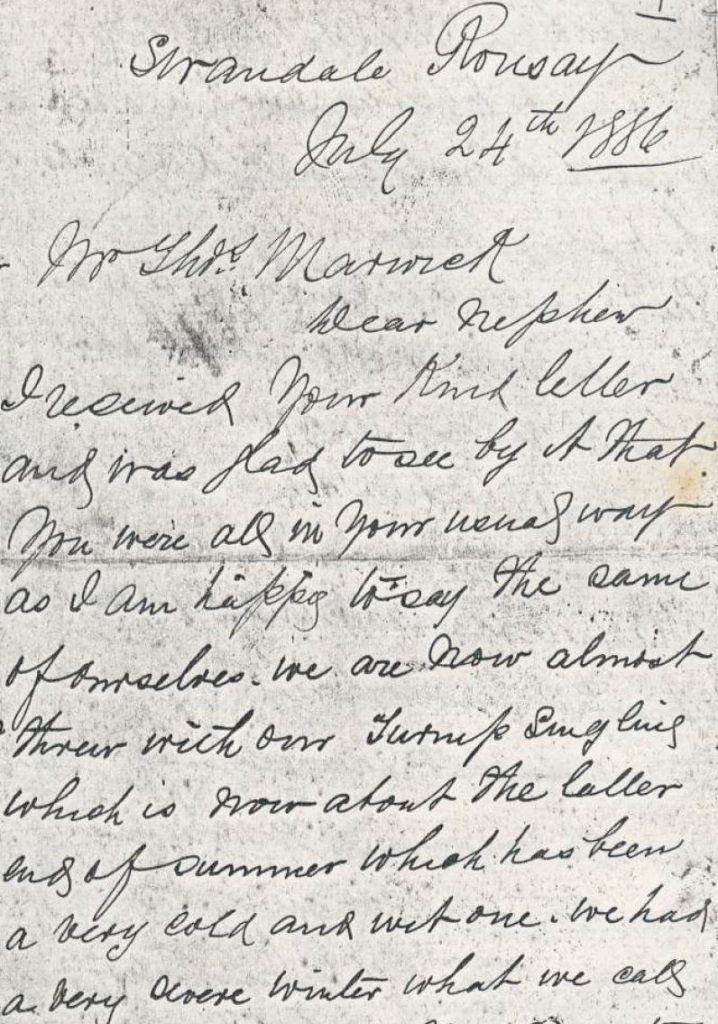
Letter from Hugh Sinclair (A632) in Rousay to his nephew Thomas Marwick, son of Hugh Marwick (A19) in Australia.
Swandale, Rousay
July 24th 1886
Mr Thomas Marwick
Dear Nephew
I received your kind letter and was glad to see by it that you were all in your usual way, as I am happy to say the same of ourselves.
We are now almost through with our turnip singling which is now about the latter end of summer which has been a very cold and wet one. We had a very severe Winter what we call nowadays one of the old Winters which your mother can tell you about. After such a one we expected one of the old Summers but we have been disappointed. The weather is nothing like what it was in your mother’s childhood. She will can tell you about them being troubled with the cows running in the hot weather. I have not seen them doing so this 20 years. It may be another kind of cattle, but no doubt the weather is nothing near so warm.
John Craigie (A819) died on the 4th of May and was buried on the 6th, just 2 years after the death of his son (David Craigie who died of heatstroke in the Red Sea on his way to Australia). Betsy (A625, widow of John Craigie) is very much broken down. The oldest daughter (Christina A656) is going for to get married to William Grieve (B253), son of Robert Grieve of Furse. He has been out in America. He is precentor in the Free Church. He will most likely stop in Fall Down (Fa’doon) and work on the land, and Betsy will live about hands. The other daughter (Elizabeth A658) will likely take service in times, and home in times they are not reduced.
I do not know if ever your mother got the copy of her father’s will. I can send it if she likes. I may state that she has the same as the rest. My mother is life rented.
You were wanting for to know about your Uncle John. I am sorry to say that he is likely to be evicted from his farm at the term. There was one Peter Mainland in the farm with him. Some of the children was suspected to write some threatening letters to the Laird, but everybody was certain that it was none of them. It makes the farmers not able to pay their rents and plenty of the Lairds is not able for to give them the downcome that they would need so what it will turn to one cannot say.
In our large cities there is thousands going starving. I saw in a paper the other night 60,000 unemployed going through the streets of London, and in some of these large towns the authorities is giving them a diet for a penny just for to keep them alive. Trade of all kind appears to be at a standstill.
You said that John Harrold was still in Melbourne, but did not say if you knew what he was doing. A letter from him to his Mother I am sure would be a great comfort now in her time of trouble. If you see him, be kind enough for to tell him that I would make a few lines very welcome and I would give him lots of news about the young girls.
Dear Sister (he’s writing to his nephew!) Mother wishes to be remembered to you. She is now over 80 years of age and is still able for to be out of bed, and move about. She is still able for to knit my stockings, for you see, I have not got anyone for to do it but her. I have not been so fortunate as got a wife to myself. I keep a old young wife for to keep the house in order.
Tom is still stopping at the house. He goes to the fishing and works to me when not at sea. He has got four of a family. The eldest is a girl and she is 11 years of age. 2nd a boy who is 8, the other two are girls 6 and 3 years of age.
Samuel (Sinclair A631) is still in the PO in Edinburgh. He has got four of a family. The oldest is a son 17, the next two girls 13 and 6, the youngest a boy 3.
Now I will have to be drawing to a close. I hope this will find you all in good health. I see that you have shifted from your old place of abode which you were at for a long time. Please be kind enough for to write me soon again, and with kind love to you all.
I remain yours truly
H Sinclair
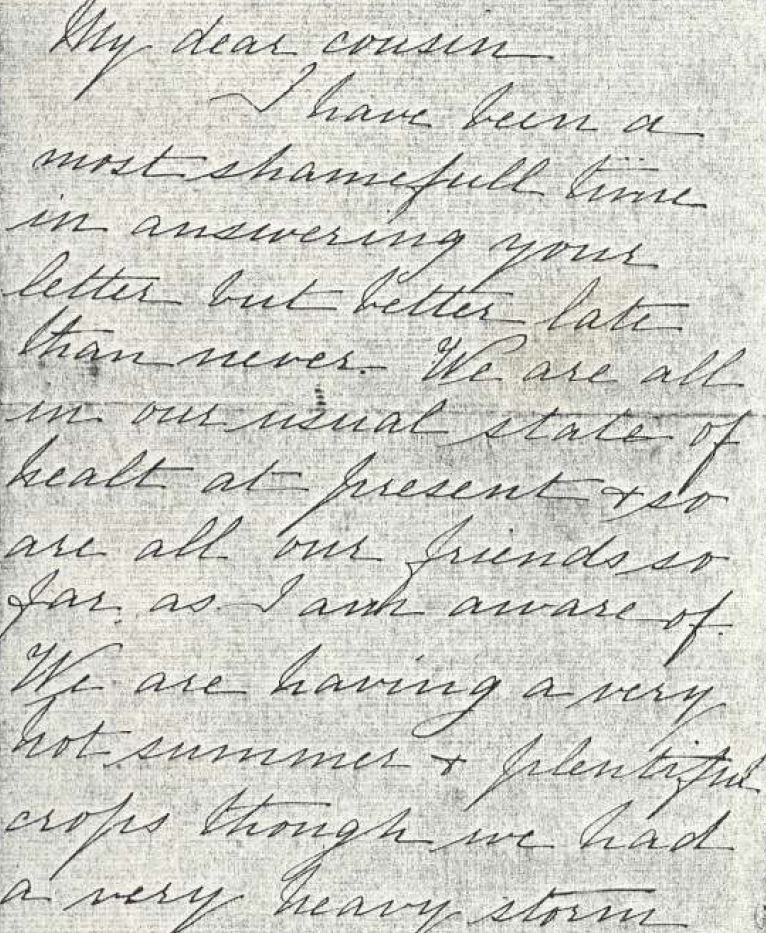
Letter from Elizabeth Craigie (B33) in NZ, to her cousin Thomas Marwick, son of Hugh Marwick (A19), in Australia.
River Bank
March 2nd 1887
My Dear Cousin.
I have been a most shameful time in answering your letter, but better late than never. We are all in our usual state of health at present and so are all our friends so far as I am aware of.
We are having a very hot summer and plentiful crops, though we had a very heavy storm of wind about three weeks ago which destroyed a great deal of property. The oldest settlers never remember having such a storm before.
Well dear Thomas, we are still fighting the battle of life as best we can, though I can assure you the loss of our dear mother [Isabella] has been a great blow to us all, for she was so kind and gentle to all around her, that one could not help loving her.
I remember so well the day your brother Hugh went away. She followed him up the road as far as Mrs Mitchell’s and she told me when she kissed him and said goodbye to him, she said she would never see him here again and he said to her that they would meet in heaven. I have no doubt they have met there now. Not so very long between their deaths either, but it is the way of the world and our turn will come too, sooner or later.
I am sorry to tell you that Mrs Mitchell, that is George Gibson’s sister, has lost her respect in the district all together. There was a man, the name of Brooks, came to work at the New Bridge, a very little worth man. He had been married twice before, one wife still living, and he has taken up with her and she has had a child to him. The two oldest girls are at service and now none of her old friends take any notice of her. It is a great pity to think she has so far forgotten herself.
Let me know when you write how cousin Annie and Will Yorston are getting on. Give our best love to dear Aunt and Uncle and tell Uncle I want his photo. Also to dear Maggie and your own dear self.
Believe me dear Thomas
Your affect cousin
Lizzie Craigie
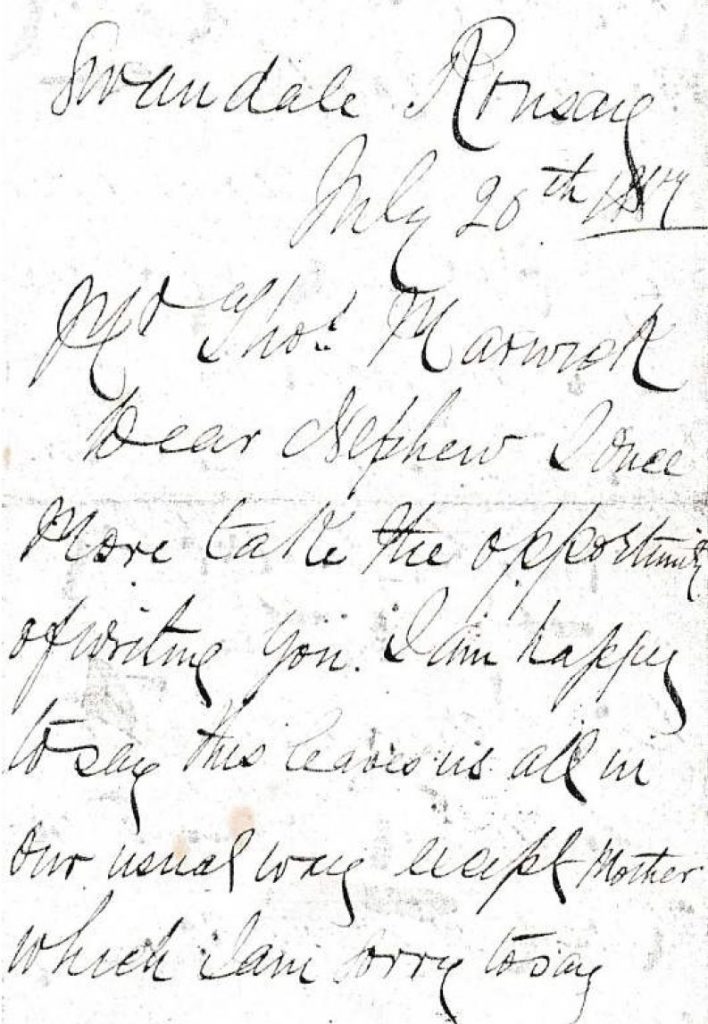
Letter from Hugh Sinclair of Swandale, Rousay, to his nephew Thomas Marwick in Australia, son of Hugh Marwick (A19) and Margaret Sinclair (A622).
Swandale, Rousay
July 20th 1887
Mr Thos Marwick
Dear Nephew
I once more take the opportunity of writing you. I am happy to say this leaves us all in our usual way except mother who I am sorry to say has been confined to bed for these 2 months. I rather don’t think she will ever be able to be out of bed any more. She is very weak. The doctor says there is a little of bronchitis about her but he must say something. More than likely death is the disease. (She d. 19 Aug 1887 of chronic bronchitis).
She sends her best wishes to you all and although not likely for to meet you in this world, hopes to meet – meet you in a far better place, never for to part.
I will think very long for mother. She was very lightsome and always telling us something. She had a wonderful memory and still has. Yet she has been a long time on this sinful world and all we shall wish for is that she may be preparing herself for the next.
I suppose you will likely know that we are having very poor times for these 3 or 4 years past and still continues. There is a great lot of the community that has got relief at last, I mean the crofters. There is of late a Bill passed in Parliament called the Crofters Bill. It fixes fair rents compensation for improvements and fixture of tenure.
I am sorry to say that I do not come under the Act being over the rent. The commissioners have not been in Orkney yet.
Your Aunt Betsy is keeping middling. Her daughter Christina has got a son. Your Uncle John (A21) is stopping at Bigland, yet he will very likely be looking out for a house this year. His son Robert (A62) has got an appointment in the Post Office in Coatbridge, a small town near by Glasgow. He is a letter carrier. The wages are not very great but steady from 16/- to 18/- per week.
There are very poor prices in all kinds of animals and horses are more than 1/2 down. Cattle are about 1/3 down and sheep are also about 1/3 down. You can get the best horses now for £30 and the best cattle for £15. I remember it double. So you see farmers are having hard times of it.
I hope this will find you in your usual way. Kind love to you all. Write Robert!
Yours truly
Hugh Sinclair
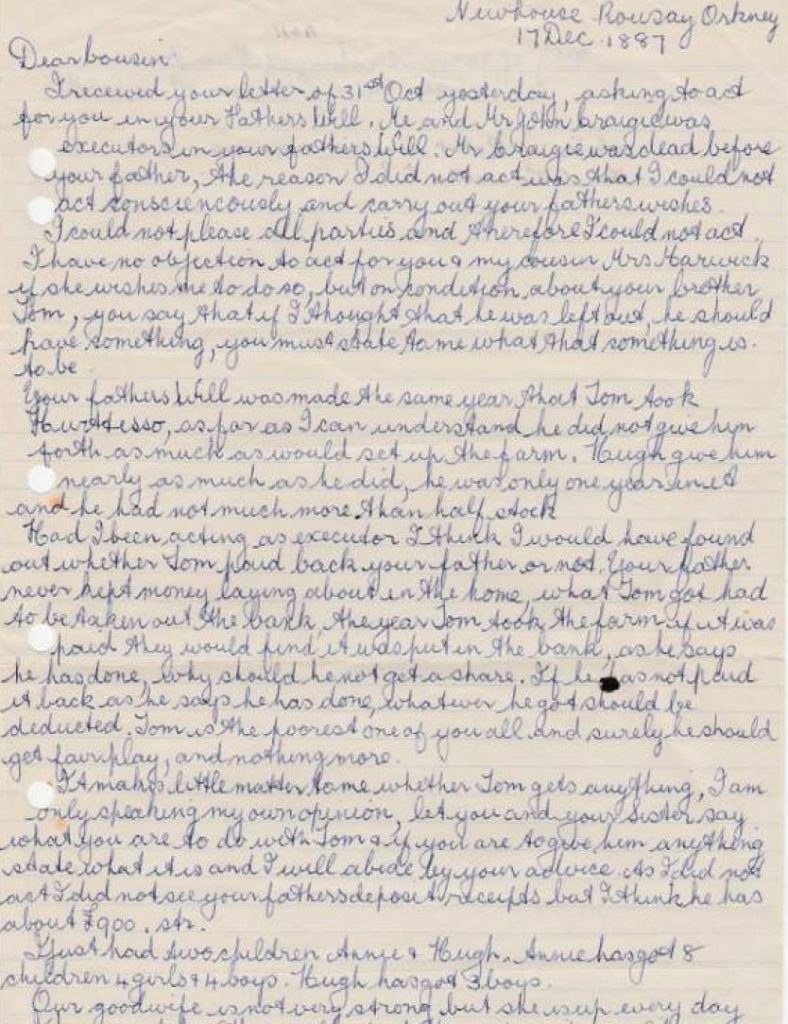
Letter from James Sinclair (A611) in Newhouse, Rousay, to a 1st cousin (name unknown), son of Robert Sinclair (A606), in Swandale, Rousay, concerning Robert Sinclair’s will.
Newhouse, Rousay, Orkney
17 Dec 1887
Dear Cousin.
I received your letter of 31st Oct yesterday, asking to act for you in your Father’s Will. Me and Mr John Craigie was executors in your father’s will. Mr Craigie was dead before your father. The reason I did not act was that I could not act conscientiously and carry out your father’s wishes. I could not please all parties and therefore I could not act. I have no objection to act for you and my cousin Mrs Marwick if she wishes me to do so but on one condition about your brother Tom. You say that if I thought that he was left out he should have something. You must state to me what that something is to be.
Your father’s will was made at the same time as Tom took Hurtiso; as far as I can understand he did not give him forth as much as would set up the farm. Hugh gave him nearly as much as he did, he was only one year in it and he had not much more than half stock.
Had I been acting as executor, I think I would have found out whether Tom paid back your father or not. Your father never kept money laying about in the home. What Tom got had to be taken out the bank. The year Tom took the farm if it was paid they would find it was put in the bank as he says he has done. Whatever he got should be deducted. Tom is the poorest one of you all and surely he should get fair play and nothing more.
It make little matter to me whether Tom gets anything. I am only speaking my own opinion. Let you and your Sister say what you are to do with Tom if you are to give him anything; state what it is and I will abide by your advice. As I did not act I did not see your father’s deposit receipts but I think he has about £900.
I just have two children, Annie and Hugh. Annie has got 8 children, 4 girls and 4 boys. Hugh has got 3 boys.
Our good wife is not very strong, but she is up every day. I have good health myself, but the infirmity of old age is creeping on. Mrs joins me in sending best respects to Mrs Sinclair and yourself.
I am your affectionate cousin
James Sinclair
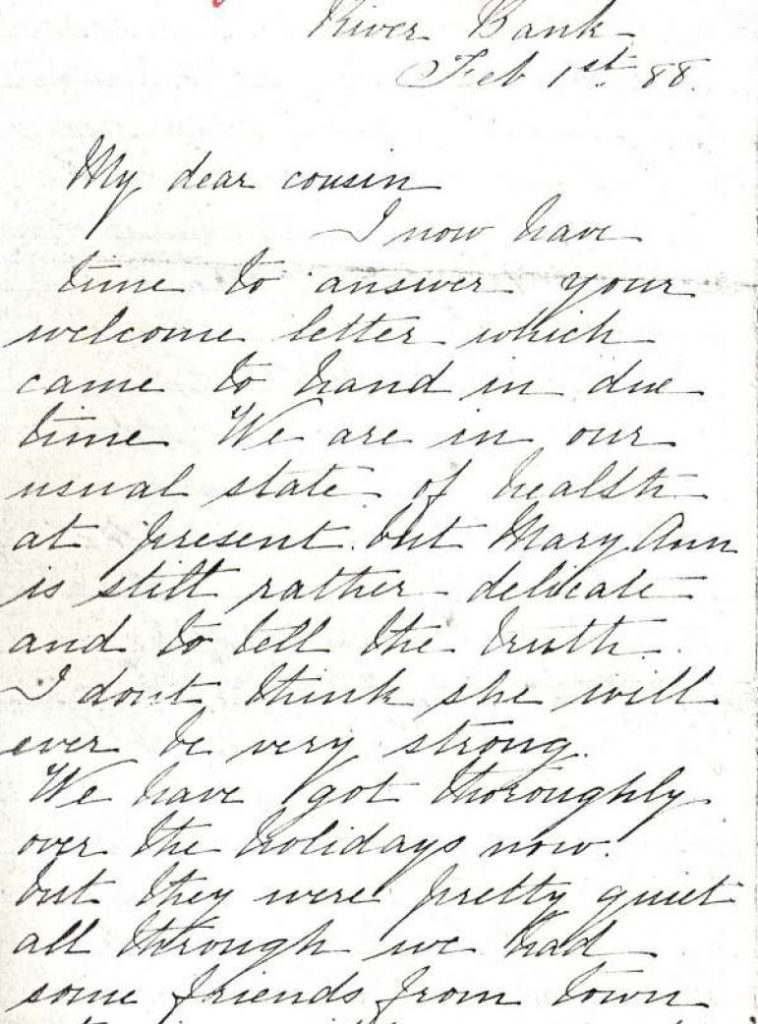
Letter from Elizabeth Craigie (B33) in NZ, to her cousin Thomas Marwick, son of Hugh Marwick (A19), in Australia.
River Bank
February 1st 1888
My Dear Cousin
I now have time to answer your welcome letter which came to hand in due time. We are in our usual state of health at present, but Mary Ann is still rather delicate, and to tell the truth, I don’t think she will ever be very strong. (Mary Ann Craigie (B34) lived until 1940, age 71.)
We have got thoroughly over the holidays now, but they were pretty quiet all through. We had some friends from town staying with us and that made it a little livelier.
We had Uncle Isaac seeing us too. He is stopping at Gore working for Perkins, that is cousin Betsy Yorston’s husband, but I don’t think he is getting on very well. I am afraid he takes more whisky than is good for him.. His little boy is growing such a nice little fellow. He still stops with his Aunt.
We were all very sorry to hear about poor Uncle Willie but it is to be hoped he is better off. You asked me to let you know about cousin Maggie Grieve, that is Aunty Maggie’s daughter. Well I have not had a letter from her for some time, but last word I had they were getting on very well. Her husband is a sort of manager on a farm in Southland, and Uncle John’s son, his name is Thomas too (A63), is getting on fine.
I think he is glad he came to New Zealand for he would not had much prospect of getting on so well in the old country. I daresay his people would have been better off had they been out here too.
Little Mary Ann Knarston is fighting her battle in life too and I daresay it is not the easiest, for her father married his third wife and there is now six of a family of them beside Annie and she is such a little thing too. But a more loving and kind hearted girl you never met. She has a good bit of her mother about her.
About Mrs Mitchell, old Brooks is still living with her occasionally, but she nearly did for herself a short time ago. Well Thomas, it is not a nice thing to write about, but she had got in the family way again, and it appears she took drugs to remove it and nearly lost her own life thereby. But she has got all right again with a hard struggle. The doctor said it would be a long time before she would get her strength again. Her oldest daughter is to be married soon, but she does not stop at home. The three oldest are in service.
I was seeing Mrs Sinclair, that is cousin Julia (A56), today. She has got another daughter. Just fancy, this is the thirteenth. There is seven years between the last one and this. I was just telling her this one was surely meant to be a comfort to her in her old age if she is spared.
We are having very dry and windy weather here and everything looks parched up and crops in general are very backward. The Yorston Family (B211) are all in their usual and are getting on nicely, but the old people are beginning to fail a good bit now. But Aunt works as hard as ever and never seems to give in.
Well dear Thomas I don’t think I have any more to tell you about at present. Give my kind love to dear Uncle, Aunt, Cousin Maggy and the Yorston family. Please ask Annie if she has any photos of herself or the family and if so, I would very much like to have one. And please tell me when your birthday and Maggie’s is, as I want to write your names in my birthday book.
And now I must stop as they are all coming in to tea, so goodbye with fond love.
I remain your loving cousin
Lizzie Craigie
To dear Thomas xxxxxxxxxxxx
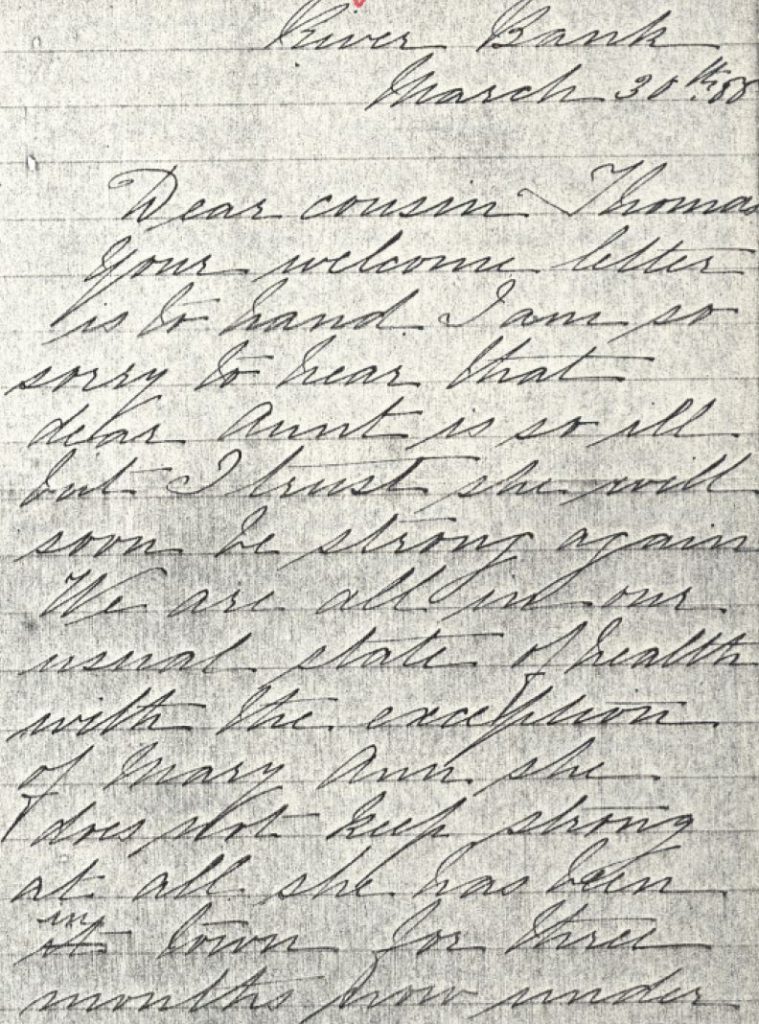
Letter from Elizabeth Craigie (B33) in NZ, to her cousin Thomas Marwick, son of Hugh Marwick (A19), in Australia.
River Bank
March 30th 1888
Dear Cousin Thomas.
Your welcome letter is to hand. I am so sorry to hear that dear Aunt is so ill, but I trust she will soon be strong again. We are all in our usual state of health with the exception of Mary Ann. She does not keep strong at all. She has been in town for three months now under the doctor’s treatment. I do hope she will soon get strong again.
Thank you very much for all your birthday dates. I see cousin Maggie’s is just four days after mine on the twenty second of June and her the twenty fourth.
There is very little excitement here at present. A lot of the young men about here got up a Harvest Home about a week ago and it passed off very nicely. The shooting season has just commenced and there is a great number of fellows from town staying in this district. But there is not so much game now as there used to be.
We are having very bad weather here at present. We have not had a fine day in a long time and we have a lot of stooks not in yet. I am afraid there will be a lot of grain spoilt this season and that makes hard times for the poor farmers.
All our friends so far as I know of are well and enjoying good health. The Yorstons are busy with the threshing and getting on fine.
Dear Thomas, I have no more news this time, everything is so quiet at present. So with best love to all.
I remain yours, affect cousin
Lizzie Craigie
To Dear Thomas xxxxxxx

